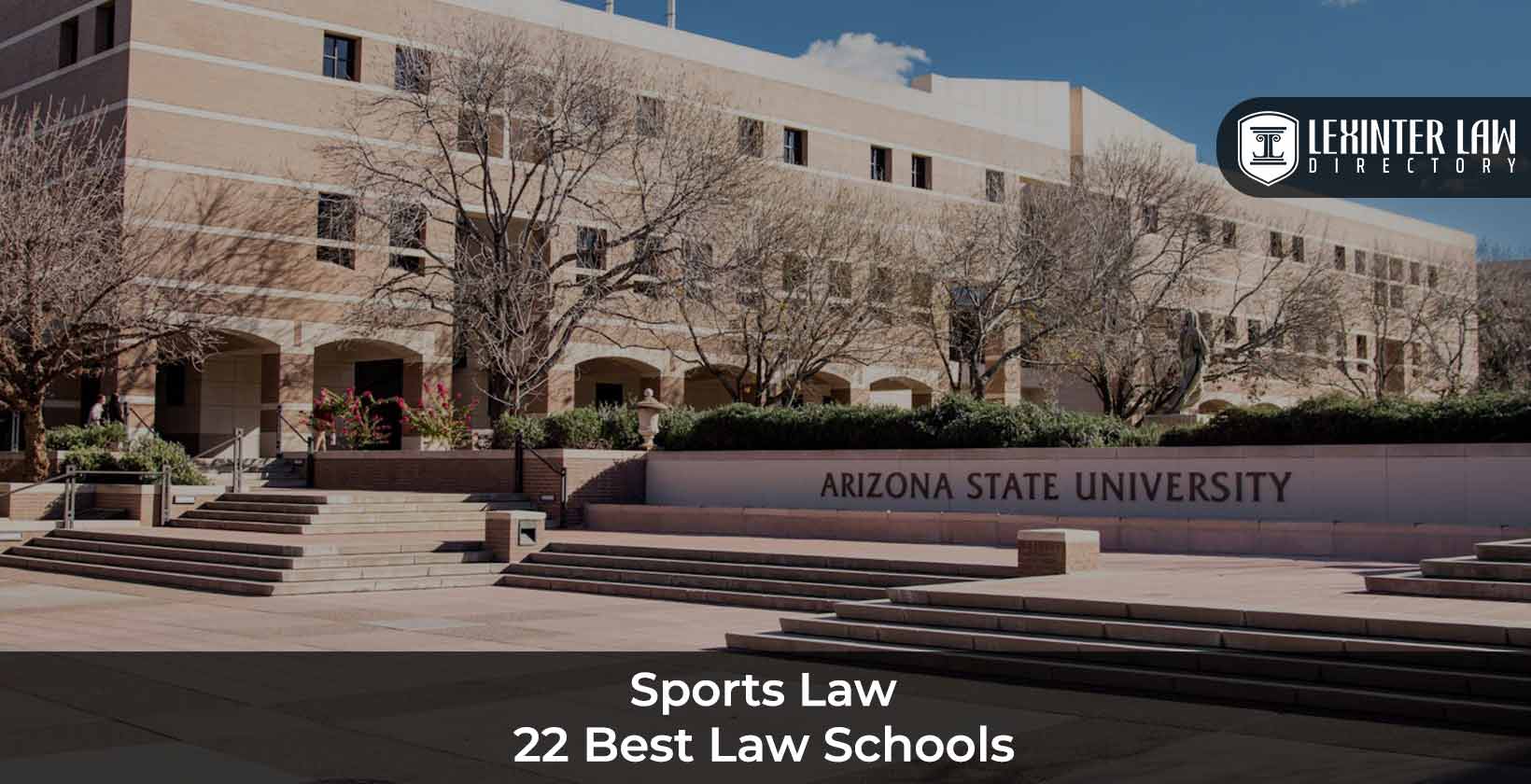22 Best Law Schools For Sports Law
The 22 best law schools for sports law provide specialized programs in sports law that blend rigorous academic training with practical experience. Obtaining a sports law degree from a top school greatly improves a student’s career prospects in the field of sports law. Best sports law schools ensure that students have diverse learning environments and opportunities to engage with legal sports professionals. Harvard University School of Law stands out as one of the premier institutions for sports law, offering a comprehensive curriculum and opportunities for hands-on experience. The Sports Law Clinic at Harvard provides students with the chance to earn a sports law certificate and engage in student competitions. Marquette University Law School is another top institution for sports law, featuring strong sports law programs led by renowned professors. Marquette’s Sports Law Program includes a variety of courses, including the Marquette Sports Law Review, one of the few dedicated sports law journals in the country. The University of New Hampshire’s Franklin Law School offers a robust sports law program led by expert faculty and features innovative courses like the Sports Betting Certificate Program. The Sports & Entertainment Law Institute at UNH hosts events and conferences that attract top names in the sports law industry, providing students with extensive networking and practical learning opportunities.
The best sports law schools help nurture the intellectual and logical development of the next generation of legal scholars.
The top 10 law schools for sports are listed below.
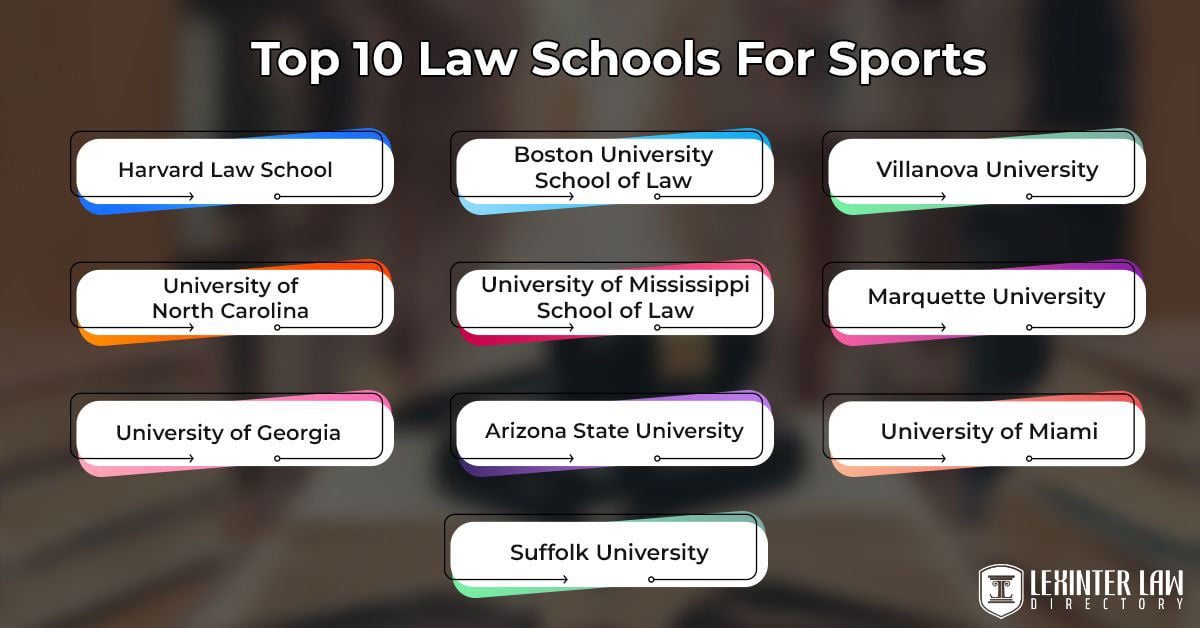
- Harvard Law School: Harvard Law School, renowned globally, is a premier institution for pursuing a career in sports law. The law school, ranked 4th among the best law schools, offers an esteemed sports law program recognized for its comprehensive curriculum and practical training opportunities. The program includes courses like Sports Law: Advanced Contract Drafting, Sports and the Law, and representation of Professional Athletes. Harvard’s Sports Law Clinic provides students with placements in legal departments of major leagues, sports franchises, and law firms.
- Boston University School of Law: Boston University School of Law, established in 1872, has developed a strong sports law program within its entertainment law curriculum. The school, located in Boston, is home to several major sports franchises. The school’s sports law program emphasizes the rights of college athletes and related legal issues. Students at BU Law benefit from the city’s vibrant sports environment, gaining practical experience through internships and moot court competitions.
- Villanova University Charles Widger School of Law: Villanova University, founded in 1842, houses the Jeffrey S. Moorad Center for the Study of Sports Law, a leading program dedicated to sports law education. The center offers a sports law certificate, participation in the Jeffrey S. Moorad Sports Law Journal, and involvement in an annual sports law symposium. Students at Villanova engage in practical learning through internships with local sports teams and law firms.
- University of North Carolina School of Law: The University of North Carolina School of Law, founded in 1845, offers a dynamic sports law program that integrates legal education with the sports industry. The curriculum includes courses on sports law, contract negotiation, and intellectual property, providing students with a broad understanding of the legal aspects of sports. The approach ensures that students gain the necessary skills and connections to succeed in the competitive field of sports law.
- University of Mississippi School of Law: The University of Mississippi School of Law offers a comprehensive sports law program with a concentration in sports and entertainment law. The school’s ranking is 120th in the best law schools. The program includes courses on sports marketing, media, entertainment law, and practical experiences through internships and clinics. Students participate in the Mississippi Sports Law Review, a student-run journal addressing legal issues in collegiate and professional sports.
- Marquette University Law School: Marquette University Law School is renowned for its sports law program. The program integrates academic courses with practical training through the National Sports Law Institute. Courses cover topics like contract negotiation, sports ethics, and intellectual property. Students contribute to the Marquette Sports Law Review and participate in moot court competitions. The program’s strong connections with professional sports teams and organizations provide students with valuable internship opportunities.
- University of Georgia School of Law: The University of Georgia School of Law, founded in 1859, offers a robust sports law program that prepares students for careers in the sports industry. The curriculum includes courses on sports law fundamentals, contract negotiation, and intellectual property. The program emphasizes networking and hands-on learning, ensuring graduates are well-equipped to navigate the sports law landscape.
- ASU Law: Arizona State University’s Sandra Day Law, ranked 36th among the best law schools, has five top-ranked specialty programs. ASU Law offers specialized programs in sports law through its Master of Sports Law and Business (MSLB) degree, a unique blend of sports, law, and business education. The program offers courses on sports operations, player development, and sports marketing. The program’s comprehensive curriculum and strategic location in Phoenix provide students with extensive networking opportunities and industry insights.
- University Of Miami School Of Law: The University of Miami School of Law, ranked 82nd among the best law schools, offers a distinguished LL.M. in Entertainment, Arts, and Sports Law. The program covers various topics, including sports law, media law, and entertainment law. The sports law curriculum includes courses on sports venue agreements, antitrust issues, labor law, and intellectual property. Students participate in practical training through organizations like Roc Nation, NBC Sports, and the Charlotte Hornets.
- Suffolk University Law School: Suffolk University Law School, established in 1906, has a comprehensive sports law program integrated within its broader entertainment and sports law curriculum. The program offers courses on sports law fundamentals, contract negotiation, and intellectual property. Suffolk’s location in Boston provides students with access to a vibrant sports scene, enhancing their learning through internships and externships with local sports teams and legal firms.
Table of Contents
- 1. ASU Law
- 2. Boston University School Of Law
- 3. Florida State University College Of Law
- 4. Antonin Scalia Law School
- 5. Harvard Law School
- 6. Marquette University Law School
- 7. Pepperdine Caruso School of Law
- 8. Seattle University School Of Law
- 9. Suffolk University Law School
- 10. Texas Tech University School Of Law
- 11. Moritz College Of Law
- 12. Thomas Jefferson School Of Law
- 13. Tulane University School Of Law
- 14. University Of Georgia School Of Law
- 15. University Of Miami School Of Law
- 16. University Of Mississippi School Of Law
- 17. University Of New Hampshire Franklin Pierce School Of Law
- 18. University Of North Carolina School Of Law
- 19. University Of Oregon School Of Law
- 20. USF School Of Law
- 21. Vermont Law School
- 22. Villanova University Charles Widger School Of Law
- How To Find A Strong Sports Law Program?
- What Do Sports Lawyers Major In?
1. ASU Law
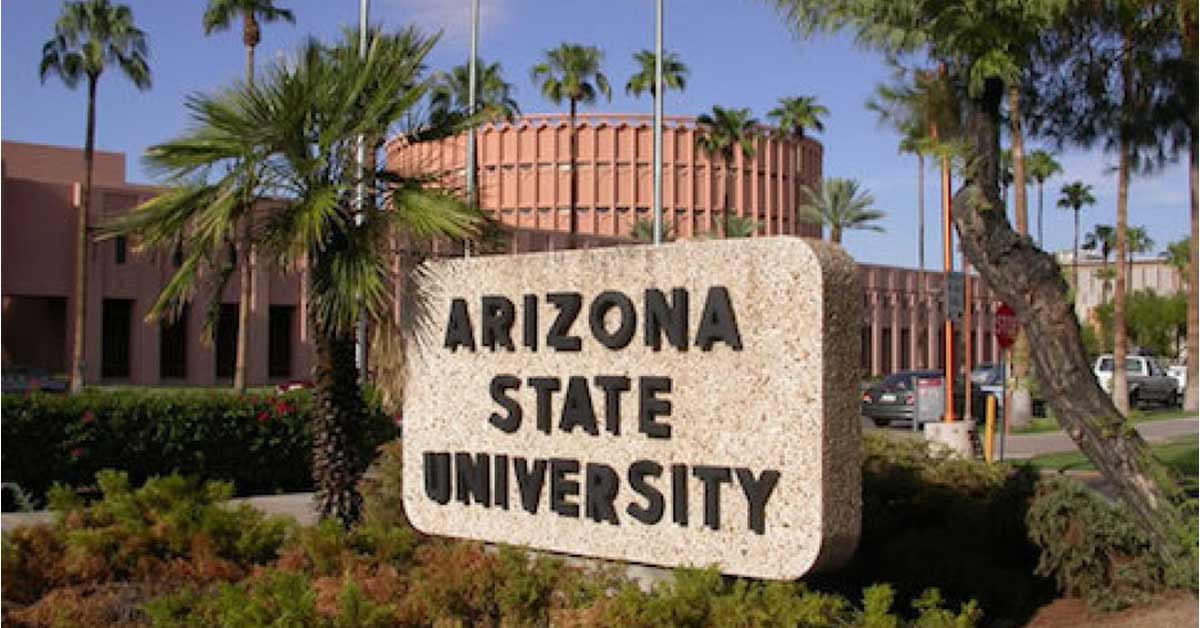
Arizona State University’s Sandra Day O’Connor College of Law, established in 1965, is one of the nationally recognized law schools in the USA. The school is dedicated to creating the next generation of lawyers and industry leaders through a comprehensive curriculum. The law school offers various graduate programs, including the Juris Doctor (JD), Master of Legal Studies (MLS), and Master of Laws (LLM). The JD program, a three-year full-time course, provides students with a strong foundation in various legal disciplines, including civil procedure, contracts, torts, and constitutional law. The MLS program is for professionals seeking to enhance their legal knowledge without becoming attorneys. The LLM program offers advanced legal study in specialized areas, benefiting practicing attorneys and recent law graduates. The acceptance rate at ASU Law is approximately 21.3%, making it a competitive institution. The entering class for 2023 had a median LSAT score of 167 and a median undergraduate GPA of 3.9.
Tuition at ASU Law varies for residents and non-residents. The school’s resident tuition is $28,839 annually, while non-resident tuition is $50,317 for the academic year of 2023-24. Additional expenses, including books, supplies, and living costs, bring the total cost of attendance to approximately $60,477 for residents and $83,235 for non-residents. Arizona State Law is ranked 36th among the best law schools, according to U.S. News and World Report. The institution is ranked 15th in public law schools and has five top-ranked specialty programs. ASU Law offers specialized programs in sports law through its Master of Sports Law and Business (MSLB) degree, a unique blend of sports, law, and business education. The program, named after MLB Commissioner Emeritus Allan “Bud” Selig, leverages the vibrant sports culture of Phoenix, home to several major sports events and professional teams. The faculty at ASU Law includes experts with extensive experience in sports law and business. Distinguished professors like Glenn Wong, who leads the sports law program, bring valuable industry insights and connections. Faculty members contribute to students’ academic and professional growth by integrating real-world sports law challenges into their teaching. The program’s faculty includes notable figures, including Scott Kaufman-Ross from the NBA and Vicky Neumeyer from the New Orleans Pelicans, providing students with unparalleled learning opportunities and mentorship from industry leaders.
Clinical opportunities in sports law at ASU Law are robust, offering practical experiences through internships, externships, and participation in the Arizona State Sports and Entertainment Law Journal. The program’s location in Phoenix, a hub for major sports events like the Super Bowl and NCAA Final Four, allows students to engage with prominent sports organizations. The opportunities enable students to apply their legal knowledge in real-world settings. Arizona State University’s Sandra Day O’Connor College of Law maintains a robust alumni network, connecting graduates across all 50 states. Regular events like virtual career fairs and networking opportunities help alumni stay connected and support their career advancement. Notable alumni include Melissa Goldenberg, General Counsel for the Phoenix Suns, and Caleb Jay, General Counsel for the Arizona Diamondbacks. Networking opportunities at ASU Law are abundant because of its strategic location in Phoenix and its strong connections with the local and national legal communities.
The course offerings of the Arizona sports law program, known as Allan “Bud” Selig’s Sports Law and Business program, include various fundamental and elective courses. Fundamental courses include topics like amateur sports law, career strategies, business communications in the sports industry, negotiations, and alternative dispute resolutions in the sports industry. Elective courses include law and business of sports branding, revenue generation in the sports industry, sports sponsorship, partnerships and activations, and many different topics. ASU Law boasts impressive employment outcomes for its graduates in sports law. 82% of the school’s graduates have sports jobs/internships within six months of graduation for the class of 2022. 73% of total alumni, in addition, are actively involved in the sports industry.
2. Boston University School Of Law
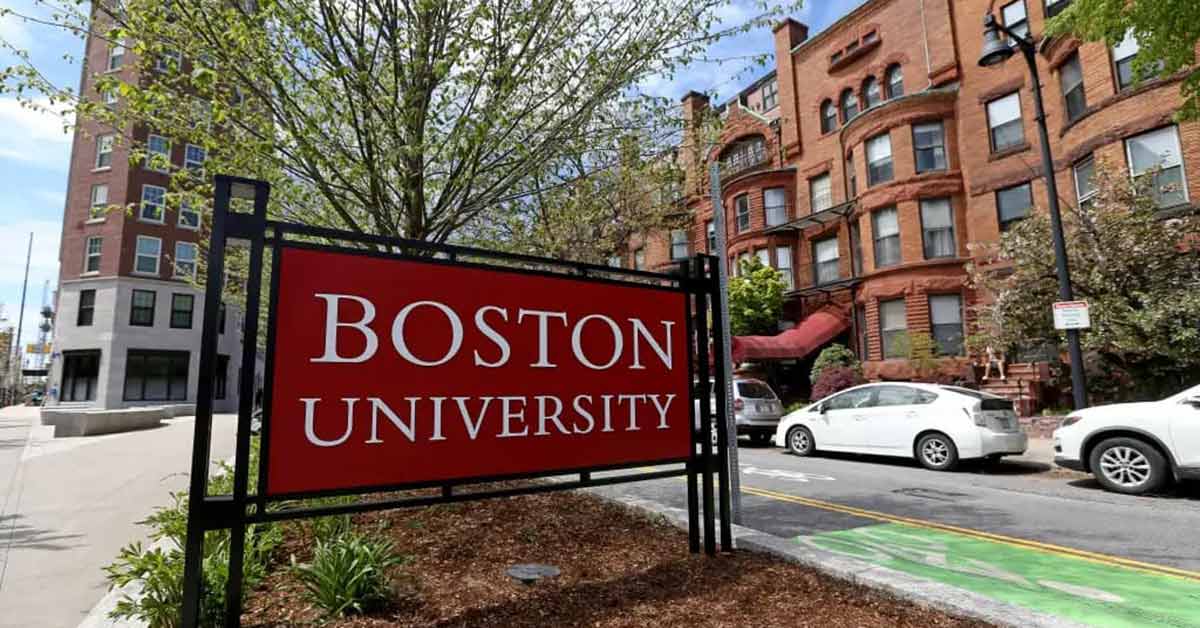
Boston University School of Law, a private law school in Chestnut, Massachusetts, was established in 1929. The school is situated 1.5 miles away from the main university campus and has an inclusive community of legal professionals. Boston University School of Law offers a comprehensive JD program renowned for its rigorous academic curriculum and distinguished faculty. The JD program covers essential areas, including contracts, torts, and civil procedure, while elective options are for deeper exploration into subjects like intellectual property, international law, and health law. The school, in addition, offers 4 LLM degrees, 16 dual-degree options, and several certificate programs. The acceptance rate at Boston Law stands at 17.82%, indicating a highly competitive admissions process. The law school’s LSAT requirements stand between 164 and 171 (25th – 75th percentile), and GPA requirements stand between 3.7 and 3.91 (25th -75th percentile). The law school seeks to admit students with diverse backgrounds and strong academic credentials, evaluating applications holistically.
Tuition for the 2024-2025 academic year at Boston University School of Law is $66,670. Additional fees, including student fees, books, and living expenses, bring the total estimated cost of attendance to approximately $89,668 for first-year JD students. Boston University School of Law holds a prestigious reputation, consistently ranking among the top law schools in the United States. The 2024 U.S. News & World Report places BU Law at 24th nationally, reflecting its strong academic programs and faculty excellence. The law school is ranked 3rd in health care law, 8th in intellectual property law, and 15th in tax law. BU Law offers a specialized program in sports law, which integrates legal principles with the sports industry’s unique dynamics. Courses cover various topics, including sports contracts, labor relations, and regulatory issues.
The faculty at BU Law includes experts with substantial experience and recognition in sports law. Professors are dedicated educators and active contributors to legal scholarship and practice. Michael C. Harbor is a notable faculty member in sports law and a leading professional in sports law. Professor Michael J. Wall is another notable faculty member who served 22 years on executive management teams for sports-related businesses. Clinical opportunities for sports law at BU Law are extensive, offering students hands-on experience through various clinics and practicums. The BU/MIT Student Innovations Law Clinic, for example, allows students to work on legal issues related to sports and technology. Various clinics provide opportunities to engage in litigation, regulatory compliance, and client counseling within the sports industry.
Boston University School of Law boasts a strong and extensive alumni network, connecting over 25,000 alumni across all 50 states and over 100 countries. Alumni have achieved success in various legal fields and maintain strong ties with the law school. The school organizes numerous events, reunions, and networking opportunities to keep alumni engaged and support their professional growth. Notable alumni include Jeffrey Toobin, a well-known legal analyst, and Dan Halem, Deputy Commissioner of Major League Baseball. Halem has played a critical role in MLB’s legal and business operations, demonstrating the practical applications of BU’s sports law education. BU Law course offerings on entertainment and sports law cover subjects like publicity rights and defamation to invasion of privacy, copyright infringement, and labor law. General topics for the course include law and sports, law and regulation of online platforms, and contract drafting. Various course offerings allow students to pursue specific topics, including the law of art and artifacts, information privacy, and intellectual property taxation. BC Law graduates in sports law are in high demand for their impressive employment outcomes. 94.2% of the school’s graduates secured employment within ten months of graduation. The majority of graduates secured full-time positions in different law firms within and outside the state.
3. Florida State University College Of Law
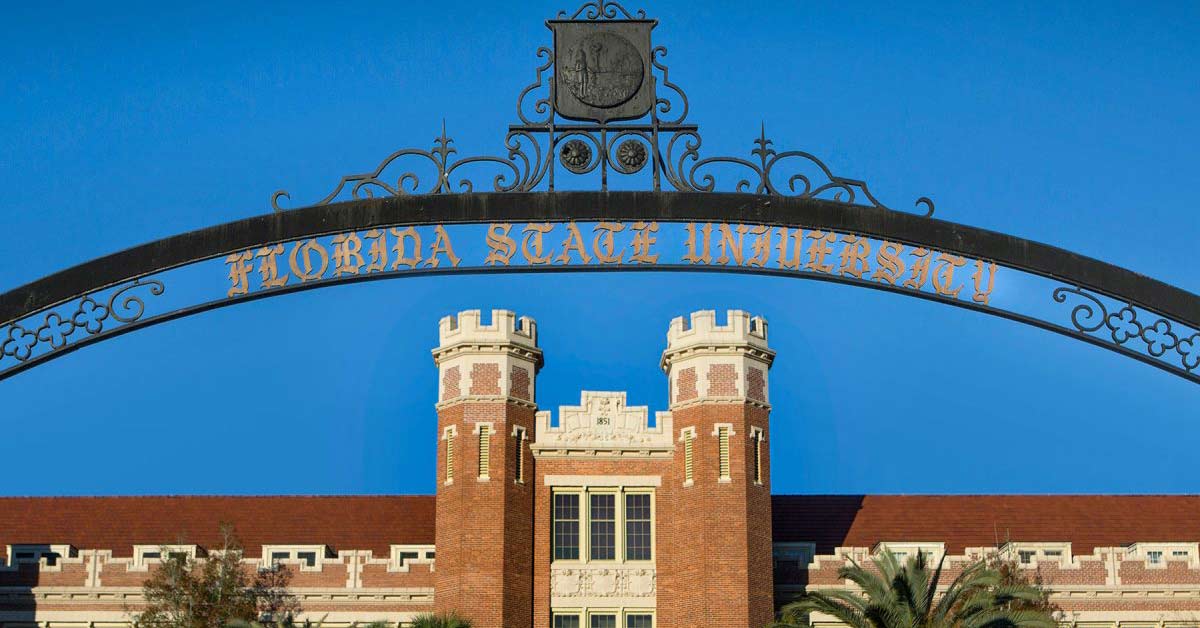
Florida State University College of Law, established in 1966, is located in Tallahassee, Florida. The school is part of Florida State University and offers multiple programs aimed at providing comprehensive legal education. The law school’s proximity to the Florida Capitol and Supreme Court provides unique advantages for students interested in public service and government law. The law school offers a comprehensive JD program with a focus on providing a robust legal education and practical experience. The program includes a variety of courses that cover essential legal areas such as constitutional law, criminal law, and environmental law. The school offers 3 LLM programs and a Juris Master program as well. The acceptance rate at Florida State University Law is 21.12%, indicating a selective admissions process. The law school’s LSAT requirements lie between 158 and 166 (25th – 75th percentile). The school’s GPA requirements are between 3.67 and 3.93 (25th – 75th percentile).
Tuition at Florida State University College of Law for the 2023-2024 academic year is $20,640 for Florida residents and $40,650 for non-residents. Financial aid is available, with 77.09% of full-time students receiving grants or scholarships. Additional expenses like books, supplies, and living costs bring the total estimated cost to approximately $42,666 for residents and $63,792 for non-residents. Florida State Law holds a strong reputation, ranked 48th among the law schools in the United States by U.S. News & World Report. The law school holds a strong position in environmental law (ranks 17th), tax law (ranks 28th), and international law (ranks 45th). FSU Law offers a specialized program in sports law, addressing the growing demand for legal expertise in the sports industry. The program covers various aspects of sports law, including contract negotiation, sports governance, and regulatory compliance. Students benefit from courses that focus on the intersection of law and sports, preparing them for careers as sports agents, team executives, and legal advisors.
The faculty at FSU Law includes experts with significant experience in sports law, providing students with valuable insights and mentorship. Professors bring a wealth of knowledge from their work in the sports industry, enhancing the academic experience with real-world perspectives. Faculty members actively engage in research and publication in sports law, contributing to the development of the specialized legal field. Clinical opportunities in sports law at FSU Law are extensive, offering students hands-on experience through various clinics and externships. The law school’s location near major sports organizations and legal entities allows students to engage directly with professionals in the field. Clinical programs in Flordia State enable students to apply their legal knowledge to real-world cases, providing representation and legal advice to sports clients. The school’s Stoop Centre for Law and Business provides students with practical experience in sports and entertainment law.
Florida State University College of Law has a robust networking and alumni community, enhancing the professional development of its students. The law school’s alumni network spans across the United States and globally, with over 10,000 graduates in various legal fields. Meggs Roberts, former State Attorney for the Second Judicial Circuit of Florida, is a remarkable alumnus of the law school. Ben Dogra, a prominent sports agent and alumni, has represented numerous NFL players. FSU Law offers a specialized course in sports law known as The Certification in Sports & Entertainment Law. The certification is for professionals and business owners who want to learn about different legal aspects of sports. The curriculum includes courses on Sports agencies, NCAA, and Nil marketing, and The ins and outs of gaming in Florida. Employment outcomes for FSU Law graduates are impressive, with a high percentage securing full-time, long-term legal positions shortly after graduation. The latest employment data indicates that FSU Law ranks 6th nationally and 1st in Florida for the percentage of graduates employed in full-time, long-term jobs requiring Bar passage. 77.2% of students passed the Bar exam while taking it for the first time. The school’s graduation rate is 95.8% within ten months of graduation.
4. Antonin Scalia Law School
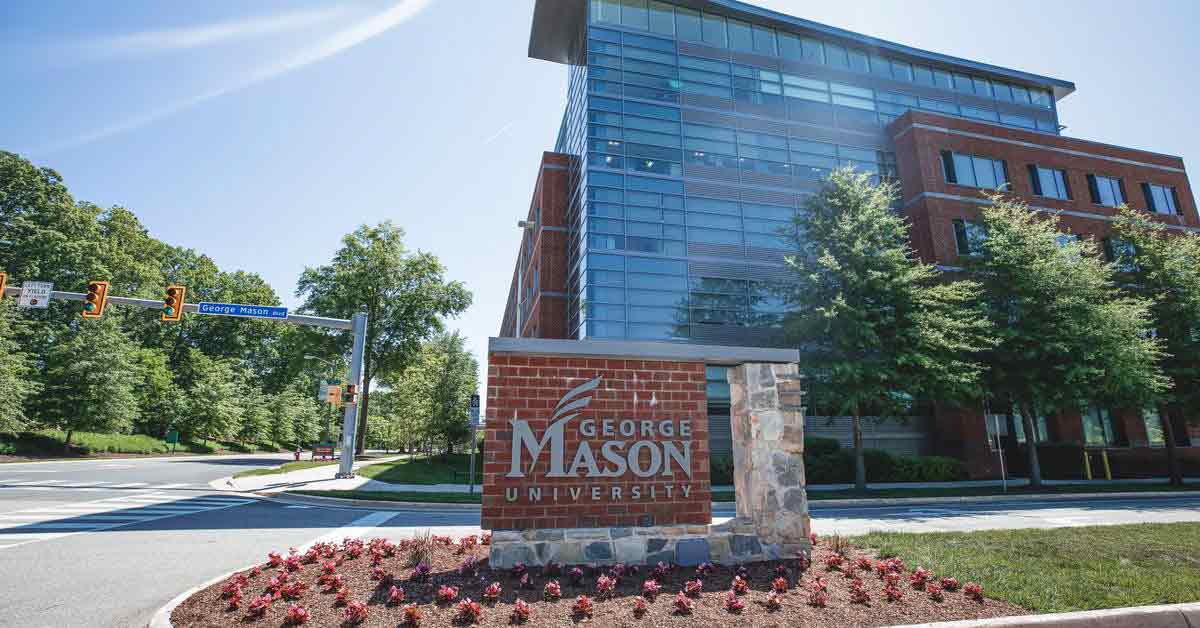
George Mason University’s Antonin Scalia Law School, located in Arlington, Virginia, offers a comprehensive legal education. The law school, established in 1972, is the largest public research university in Virginia. The school offers six JD programs, joint degrees in business and public policy, and six LLM programs, offering in-person and online options. The institution’s JD program includes full-time, part-time, and 3+3 programs. The school’s joint degree programs allow students to tailor their education to specific interests and career goals. The acceptance rate at Antonin Scalia Law School is highly competitive, at 14.03% for the 2023-2024 academic year. The median LSAT score for admitted students is 168, and the median GPA is 3.89. The statistics reflect the law school’s rigorous admissions standards and its commitment to enrolling academically strong students.
Tuition at George Mason University’s Antonin Scalia Law School varies based on residency. The school’s tuition is $26,950, while out-of-state tuition is $42,798 for the academic year of 2023-24. The total cost of attendance, including living expenses, books, and supplies, is approximately $61,483 for Virginia residents and $77,331 for non-residents. Financial aid is available, with many students receiving grants and scholarships to help offset the costs. George Mason Law School has gained significant recognition as one of the top law schools in Virginia for its reputation and ranking. The school is ranked 28th among the best U.S. law schools, according to the U.S. News and World Report. The school, in addition, is recognized as the 5th public part-time law program in the nation. The institution is recognized for intellectual property law (ranked 23th), constitutional law (ranked 34th), and business/corporate law (ranked 47th). The rankings reflect the institution’s commitment to academic excellence and its strong performance across various legal disciplines.
Antonin Scalia Law School offers specialized programs in sports law, preparing students for legal careers in the sports industry. The curriculum includes courses on sports contracts, sports governance, and regulatory compliance, ensuring a comprehensive understanding of the legal issues in sports. Students benefit from the law school’s strong connections with sports organizations and professionals. The faculty at George Mason University’s Antonin Scalia Law School includes experts with substantial experience in sports law. Faculty expertise in sports law at George Mason University includes notable professors, including Ross Davies and Michael Davis. Professor Michael Davis, a senior lecturer, brings practical experience and academic knowledge to the program, enriching the educational experience for students. Clinical opportunities in sports law at Antonin Scalia Law School are extensive, offering students practical experience through various clinics and externships. Students engage in real-world legal issues related to sports, gaining hands-on experience that is crucial for their professional development.
The alumni network includes specialized groups like the Antitrust Law Alumni Group and the Capitol Hill Alumni Group, providing focused networking and professional development opportunities. Notable alumni include Katherine Mims Crocker, a legal scholar, and Nate Silver, renowned sports statistician and founder of FiveThirtyEight. Silver’s analytical approach to sports statistics underscores the diverse applications of legal education at George Mason. The Dean’s Alumni Advisory Board supports the school’s strategic goals, ensuring continuous engagement and support for students and graduates alike. The course offerings for sports law at Antonin Scalia Law School are comprehensive, addressing various legal aspects of the sports industry. The course offerings in sports law cover topics like league governance, player contracts, player discipline and grievances, antitrust issues, and an overview of the Olympic movement and Olympic sports organizations and issues. Students explore NCAA regulations, eligibility rules for college athletics, Title IX, and intellectual property rights within sports. The comprehensive course offerings make it one of the best sports law programs. Employment outcomes for graduates of Antonin Scalia Law School are strong, with a Bar passage rate of 87.43%, which is higher than the state average. The average employment rate within ten months of graduation is 95.2%. Graduates find employment in various sectors, including private practice, government, and public interest organizations.
5. Harvard Law School
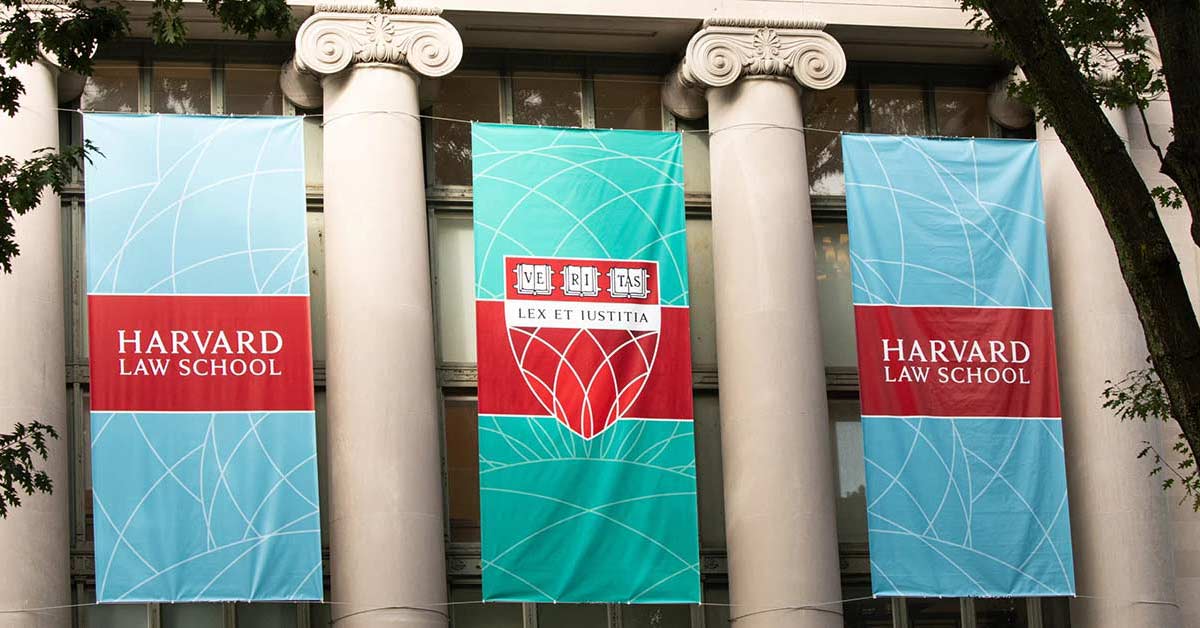
Harvard Law School, established in 1817, stands as one of the most prestigious law schools globally. The school is located in Cambridge, Massachusetts, and is reputed nationally as one of the best sports law schools. The school offers a comprehensive legal education through its Juris Doctor (JD), Master of Laws (LL.M.), and Doctor of Juridical Science (SJD) programs. The JD program emphasizes a rigorous curriculum, providing students with a strong foundation in various areas of law, including constitutional law, criminal law, and international law. Harvard Law School offers numerous clinics and research programs that allow students to gain practical experience and engage in advanced legal studies. The acceptance rate at Harvard Law School is notably low, reflecting its highly selective admissions process. The acceptance rate for the academic year of 2023-24 stands at 9.6%, with a median LSAT score of 174 and a median undergraduate GPA of 3.93. The school receives thousands of applications annually, making it one of the most competitive law schools in the United States.
Tuition at Harvard Law School for the 2024-2025 academic year is $78,692. Students must budget for various fees and living expenses, bringing the total estimated cost of attendance to approximately $116,000 per year. The estimate includes health insurance, room and board, books, and personal expenses. Harvard Law School holds a prestigious reputation and consistently ranks among the top law schools worldwide. The law school is currently ranked 4th in the best law schools. Various programs of the school are ranked within the top 5 nationally, which includes constitutional law (ranked 1st), international law, criminal law, and business law (ranked 2nd). Harvard Law School offers specialized programs in sports law, providing students with a unique blend of legal education and practical experience in the sports industry. The curriculum integrates legal theory with real-world applications, preparing students for careers as sports agents, team executives, and legal advisors. The program’s emphasis on sports’ legal and business aspects ensures graduates are well-equipped to handle the industry’s complex legal challenges.
Faculty expertise in sports law at Harvard Law is significant, with notable professors including Peter Carfagna and Christopher Bavitz. Peter Carfagna, a lecturer on law, oversees the Sports Law Clinic and brings extensive experience from his career in sports management and law. Christopher Bavitz, the WilmerHale Clinical Professor of Law, contributes expertise in intellectual property and media law, enriching the sports law program. Professors combined knowledge and industry connections provide students with invaluable mentorship. Clinical opportunities in sports law at Harvard Law School are robust, allowing students to gain hands-on experience in various settings. The Sports Law Clinic places students in legal departments of major leagues, sports franchises, and law firms representing athletes and teams. Students engage in contract work, arbitration, litigation, and legal research, gaining practical skills essential for their future careers. The placements provide real-world exposure to the legal issues faced by sports organizations and athletes.
Harvard Law School boasts a strong and extensive alumni network, significantly enhancing professional development opportunities for students and graduates. The Harvard Law School Association connects over 40,000 alumni worldwide, offering mentorship, career guidance, and networking events. The school’s notable alumni include Alex Spiro, a prominent defense attorney for NBA players, and Mike Zarren, Vice President of Basketball Operations and Team Counsel for the Boston Celtics. Course offerings for sports law at Harvard Law School are comprehensive, addressing various legal aspects of the sports industry. The curriculum includes courses including Sports and the Law, which examines legal issues related to professional and amateur sports, and Sports and the Business, focusing on the economic and business aspects of sports. Additional courses cover topics like antitrust law, contract negotiations, and intellectual property in sports. The courses, taught by experienced faculty, provide students with a thorough understanding of the legal and business dimensions of the sports industry. Employment outcomes for Harvard Law School graduates are exceptional, with a high percentage securing full-time, long-term legal positions shortly after graduation. The Bar exam pass rate for Harvard Law graduates is 96.10%, reflecting the rigorous academic preparation provided by the school. Graduates find employment in various sectors, including top law firms, government agencies, public interest organizations, and corporate legal departments.
6. Marquette University Law School

Marquette University Law School, established in 1892, is a private institution located in Milwaukee, Wisconsin. The campus, featuring the state-of-the-art Eckstein Hall, provides an ideal environment for legal studies and professional growth. Marquette University Law School offers a comprehensive JD program that includes core courses in contracts, torts, civil procedure, and constitutional law. The school supports joint degrees and certificate programs, allowing students to tailor their education to their career goals. The law school, in addition, offers a joint J.D./M.B.A. in Sports Business program with the Graduate School of Management. The acceptance rate at Marquette University Law School is 45.51%, indicating a moderately competitive admissions process. The average LSAT score for admitted students is 155, with a median undergraduate GPA of 3.61. The law school aims to admit a diverse and accomplished student body, considering various factors beyond test scores and grades, including personal statements, letters of recommendation, and relevant work experience. Tuition at Marquette University Law School for the 2024-2025 academic year is $52,050. The total estimated cost of attendance, including living expenses, books, and other personal costs, is approximately $74,196 per year.
Marquette University Law School holds a solid reputation and is well-regarded in the legal education community. The law school is ranked 68th in best law schools and 22nd in part-time law. The school’s ranking is 26th in legal writing, 36th in dispute resolution, and 78th in intellectual property law. Marquette Law School offers specialized programs in sports law, making it a prominent choice for students interested in the field. The National Sports Law Institute (NSLI) at Marquette Law provides extensive coursework, research opportunities, and practical experiences in sports law. The faculty at Marquette University Law School includes experts with significant experience in sports law. Professors such as Matt Mitten and Paul Anderson contribute their extensive knowledge and professional experience to the sports law program. Matt Mitten, the Director of the NSLI, is a renowned expert in sports law and has published extensively on the subject. Paul Anderson, the Associate Director of the NSLI, brings practical insights from his work with sports organizations and his involvement in sports law litigation and compliance matters.
Clinical opportunities in sports law at Marquette University Law School are abundant and notable among the top law schools in Wisconsin. The clinical opportunities provide students with hands-on experience in the field. The National Sports Law Institute offers externships and internships with professional sports teams, sports law firms, and regulatory bodies. The placements allow students to apply their legal knowledge in real-world settings, working on issues like contract negotiations, compliance, and dispute resolution. Marquette Law offers extensive networking opportunities through its strong alumni network and numerous events. The Marquette Law Alumni Association facilitates connections among alumni and current students, providing mentorship and career guidance. Regular events, including the Sports Law Alumni Networking Panel, enable students to interact with successful graduates working in various legal fields. The robust network helps students secure internships, clerkships, and job placements, enhancing their professional development and career prospects. The course offerings for sports law at Marquette University Law School are comprehensive and diverse. The course offerings include topics ranging from sports industry taxation issues, legal and business issues in collegiate athletics, and legal issues in youth, high school, and recreational sports. Students, in addition, take specialized workshops on topics like esports, sports facilities, and Name-Image-Likeness (NIL) in college athletics. Employment outcomes for Marquette University Law School graduates are strong, with a high percentage securing full-time positions shortly after graduation. 97.27% of graduates were employed ten months after graduation. Graduates mostly find positions requiring Bar passage, with many working in sports industries.
7. Pepperdine Caruso School of Law
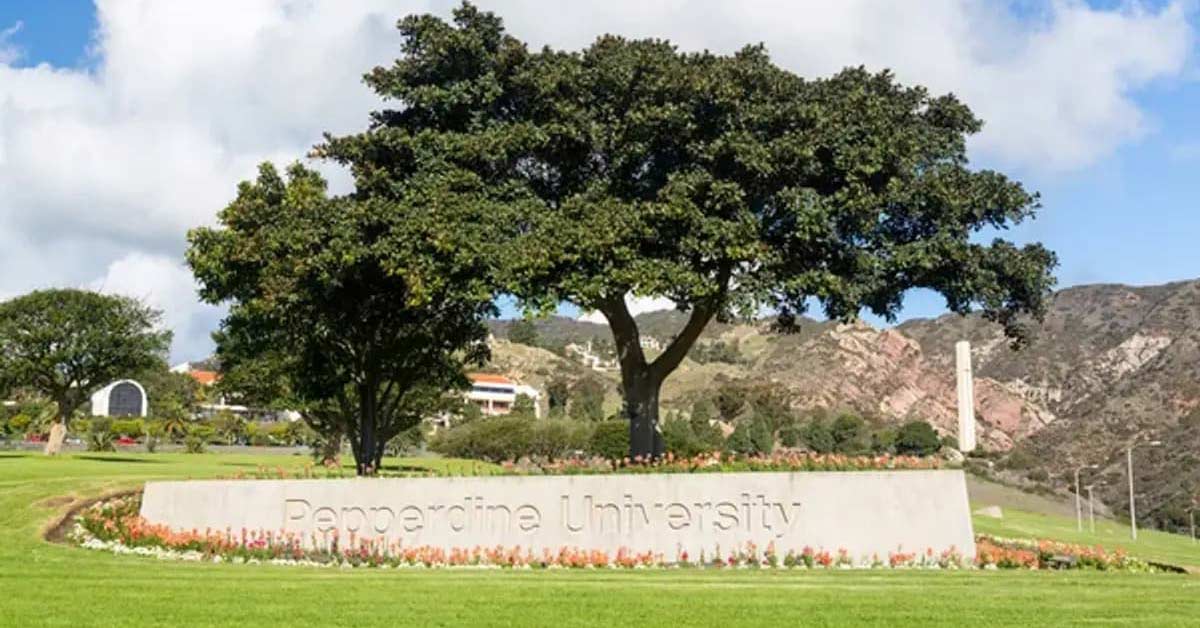
Pepperdine University Caruso School of Law, located in Malibu, California, offers a comprehensive legal education with a focus on practical skills and ethical practices. The School of Law, founded in 1969, is a nationally recognized private research university. The school provides various programs, including the Juris Doctor (JD), Master of Laws (LL.M.), and Master of Dispute Resolution (MDR). The JD program emphasizes experiential learning, ensuring students gain hands-on legal experience through clinics and externships. The J.D. requires 88 credits to be completed. The LLM degree offers specialized knowledge on a topic. The acceptance rate at Pepperdine University Caruso School of Law is 28.18%, indicating a competitive admissions process. The school’s LSAT requirements lie between 159 and 166 (25th – 75th percentile), and GPA requirements lie between 3.48 and 3.93 (25th – 75th percentile). Tuition at Pepperdine University Caruso School of Law for the 2024-2025 academic year is $69,950. The total estimated cost of attendance is approximately $102,436 per year, including living expenses, books, and different personal costs. Pepperdine Law holds a distinguished reputation and ranks 52nd among the best law schools. The school is particularly noted for its strong emphasis on clinical training and dispute resolution. The 2023 U.S. News & World Report ranked Pepperdine’s dispute resolution program second in the nation. The school’s clinical training program is ranked 23rd and 42nd in constitutional law nationally.
Pepperdine Law offers specialized programs in sports law, providing students with comprehensive education and practical experience in the field. The program includes courses on sports law, contract negotiations, and regulatory issues, preparing students for various roles in the sports industry. The entertainment, media, and sports law certificate program enhances the focus, offering additional coursework and experiential learning opportunities. The specialized programs are designed to equip students with the knowledge and skills necessary to navigate the complexities of sports law. The faculty at Pepperdine Law includes experts with significant experience in sports law, providing students with valuable insights and mentorship. Notable professors such as Maureen Weston and Joel Harrison contribute their extensive knowledge and professional experience to the sports law curriculum. Maureen Weston, who co-directs the entertainment, media, and sports law program, has published extensively on sports law topics and brings practical insights from her work in the field. Joel Harrison’s expertise in international sports law and governance further enriches students’ academic experience. Clinical opportunities for sports law at Pepperdine Law are extensive, offering students hands-on experience through various clinics and externships. The law school’s proximity to Los Angeles provides unique opportunities for students to work with professional sports teams, sports law firms, and regulatory bodies. The clinical placements allow students to apply their legal knowledge to real-world situations, gaining practical skills essential for their careers.
Pepperdine University Caruso School of Law offers extensive networking opportunities supported by its strong alumni network. The alumni association hosts regular events, allowing current students to connect with successful graduates. The events include panel discussions, workshops, and social gatherings, providing invaluable opportunities for mentorship and professional development. Notable alumni include James Lofton, a former NFL wide receiver and Hall of Famer, and Ryan O’Connor, General Counsel for the Los Angeles Dodgers. The alumni demonstrate the diverse applications of Pepperdine’s sports law training in professional sports settings. Pepperdine Law, notable among the top law schools in California, provides diverse course offerings in sports law. The courses are designed to prepare students for various roles within the sports industry. Courses include sports law, contract negotiations, and entertainment and media law. The courses cover topics including athlete representation, sports marketing, and regulatory compliance, ensuring students understand the legal issues in sports. Employment outcomes for graduates of Pepperdine Law are strong, with 91.4% of graduates securing full-time positions shortly after graduation. The Career Development Office provides extensive support, including career counseling, job placement assistance, and networking opportunities in the sports law industry.
8. Seattle University School Of Law
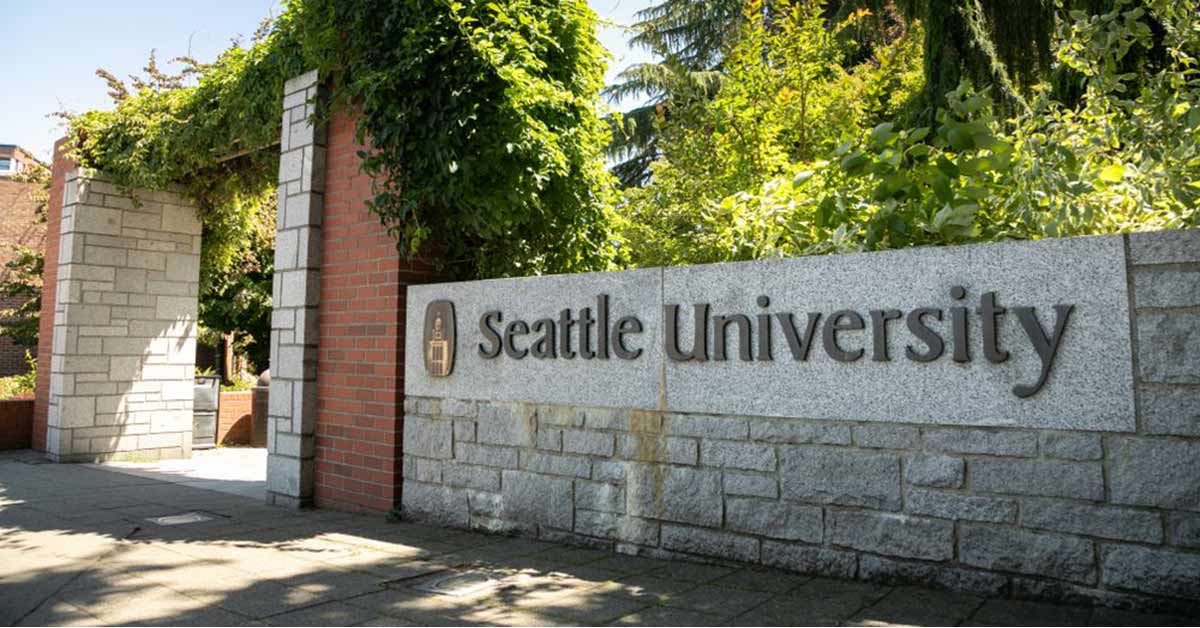
Seattle University School of Law, located in Seattle, Washington, provides a comprehensive legal education focused on social justice and professional practice. The law school, established in 1972, is a member of the Association of American Law Schools. The school offers several degree programs, including the Juris Doctor (JD), Master of Laws (LL.M.), and Master of Legal Studies (MLS). The JD program features a strong emphasis on experiential learning, offering students numerous opportunities to engage in practical legal work through clinics, externships, and simulation courses. The school’s mission centers on educating outstanding lawyers who are committed to the highest ethical standards and social justice. Seattle Law has an acceptance rate of 52.26%, making it a moderately selective institution. The median LSAT score for admitted students is 157, with a median undergraduate GPA of 3.51. The school evaluates applicants on a holistic basis, considering academic metrics and personal statements, letters of recommendation, and relevant work experience.
Tuition at Seattle University School of Law for the 2024-2025 academic year is $59,494. The total estimated cost of attendance is approximately $92,236 per year, including living expenses, books, and different personal costs. Financial aid is available to help offset the costs, with 80.46% of full-time students receiving grants or scholarships. The law school ranks 114th in best law schools and 23rd in part-time law. Seattle Law is notable for its legal writing (ranking 8th), clinical training (ranking 23rd), and intellectual property law (ranking 53th). Seattle University Law offers specialized programs in sports law, providing students with comprehensive education and practical experience in the field. The sports law curriculum includes courses on sports governance, contract negotiations, and regulatory compliance, preparing students for various roles within the sports industry. The programs are designed to equip students with the knowledge and skills necessary to navigate the complexities of sports law.
Seattle University Law offers robust clinical opportunities in sports law, allowing students to gain hands-on experience through internships and externships. The law school’s location in Seattle provides unique opportunities to work with professional sports teams, sports law firms, and regulatory bodies. The clinical placements enable students to apply their legal knowledge in real-world settings, working on issues including contract negotiations, compliance, and dispute resolution. Seattle University School of Law offers extensive networking opportunities supported by a strong alumni network. The alumni association facilitates connections among over 12,000 graduates through various events, workshops, and networking activities. Tod Leiweke, CEO of the Seattle Kraken, and Tina Podlodowski, former CEO of Big Brothers Big Sisters of Puget Sound and current Chair of the Washington State Democratic Party, are notable alumni of the law school. The sports law curriculum at Seattle University Law includes diverse course offerings designed to equip students with comprehensive legal knowledge and practical skills. Key courses include sports governance, athlete representation, and legal issues in collegiate athletics. The courses cover various aspects of sports law, such as contracts, intellectual property, and regulatory compliance. Seattle University sports law graduates demonstrate strong employment outcomes, with a significant percentage securing full-time positions shortly after graduation. The Bar exam pass rate for first-time takers was 76.4% for the class of 2024. Graduate’s employment rate within ten months of graduation is 84.4%.
9. Suffolk University Law School
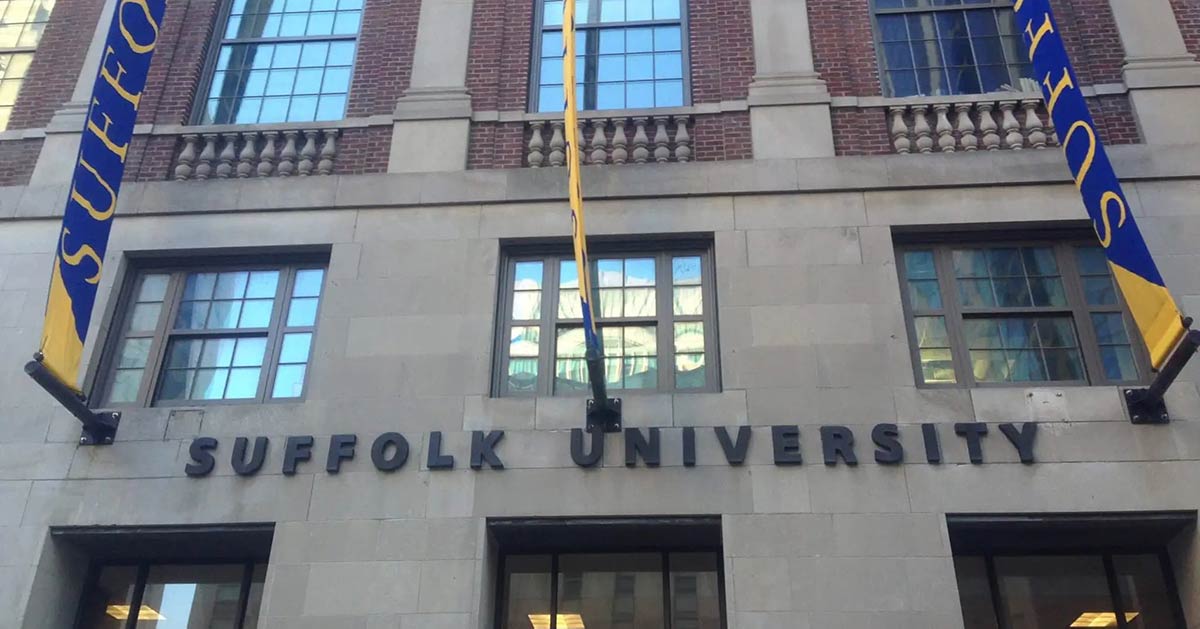
Suffolk University, situated in Boston, Massachusetts, is one of the most innovative schools in the nation. The university is recognized nationally for having four specialized legal skill programs. Suffolk Law provides several programs for earning a Juris Doctor (JD) degree, including full-time, part-time evening, accelerated, and hybrid online formats. The full-time program spans three years, while the part-time evening program is completed in either three or four years, depending on the student’s schedule. The accelerated JD program allows students to graduate in as little as two years by taking classes year-round. The hybrid online JD program offers flexibility, combining in-person and online coursework, and is ideal for students needing a more adaptable schedule. The acceptance rate at Suffolk University Law School is approximately 64.3%, making it moderately competitive. The tuition and fees amount to $61,044, a 5.71% increase from the previous year for the 2024-25 academic year.
Suffolk University Law School enjoys a solid reputation, with a ranking of 130th among the best law schools. The school is ranked 26th in part-time law. The U.S. News & World Report ranks Suffolk Law among the top law schools for legal writing (ranks 3rd), clinics (ranks 12th), trial advocacy (ranks 31st), and dispute resolution (ranks 21st). Suffolk University Law, one of the top law schools in Massachusetts, offers a highly regarded specialized sports law program. The program offers a comprehensive curriculum covering copyright and trademark law, entertainment law, gaming law, and sports law. Students benefit from small class sizes and a robust alumni network that includes professionals working with major sports teams and entertainment companies. The Sports and Entertainment Law Association at Suffolk hosts regular events featuring industry experts and alumni, providing valuable networking opportunities for students aiming to enter the sports law field. Faculty expertise in sports law at Suffolk University Law School is notable, with experienced practitioners like Kristen Kuliga, who is known for her work as a sports agent and legal consultant. Faculty members bring practical experience and industry insights to the classroom, enriching the educational experience for students. Clinical opportunities in sports law at Suffolk Law are extensive, offering students practical experience through various clinics and externships. The law school features 13 in-house clinics where students apply their classroom knowledge to real-world legal issues. Suffolk Law’s sports clinics are nationally ranked and provide students with the chance to work under the supervision of experienced faculty.
Suffolk University Law School’s sports law program benefits significantly from its strong networking and alumni connections. The Sports and Entertainment Law Student Association hosts numerous networking events, panel discussions, and fairs featuring prominent alumni working in the sports industry. Notable alumni include Mandy Petrillo, senior club counsel for the Boston Red Sox, and Kim Miale, NFL agent and general counsel for ROC Nation Sports. The connections provide students with valuable mentorship and job opportunities, enhancing their professional prospects in the competitive field of sports law. Course offerings in sports law at Suffolk Law School cover various relevant subjects. Students take courses in sports law, entertainment law, copyright law, gaming law, and intellectual property and licensing. The curriculum includes practical courses, including labor and employment arbitration, negotiating business transactions, and contract drafting. Employment outcomes for sports law graduates from Suffolk University Law School are strong, reflecting the effectiveness of the program and its extensive networking opportunities. 87.3% of graduates have secured positions with major sports organizations, law firms, and entertainment companies.
10. Texas Tech University School Of Law
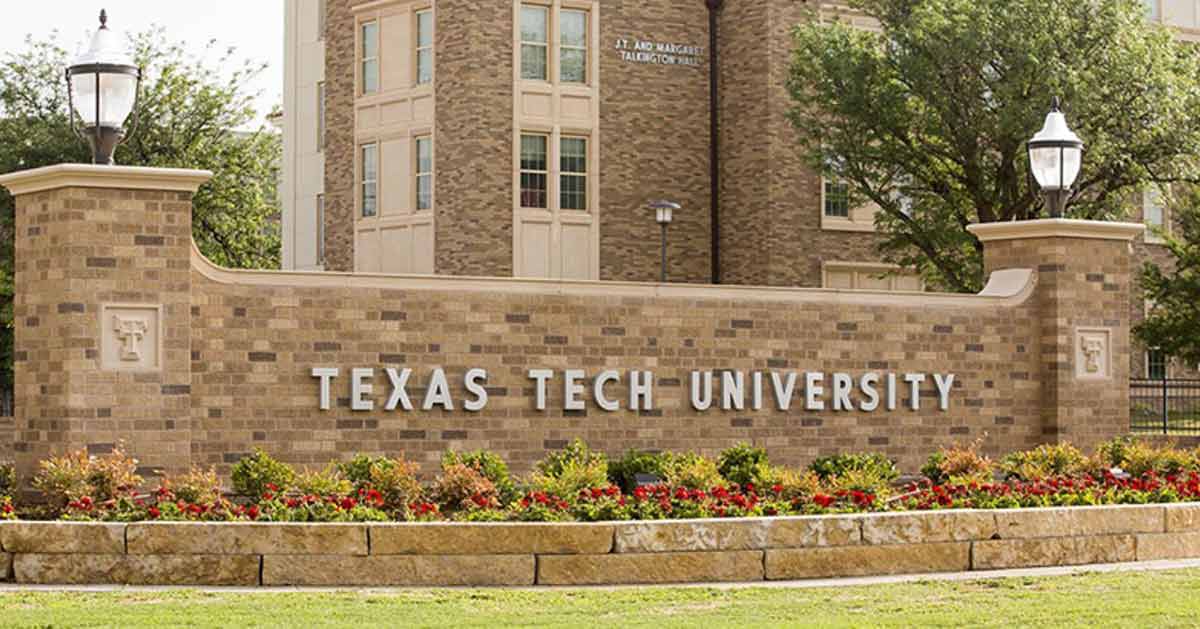
Texas Tech University is an ABA-accredited law school in Lubbock, Texas. The law school, established in 1972, is a notable public law school. Texas Tech University School of Law offers a rigorous and practical JD program designed to prepare students for successful legal careers. Students engage in a year-long legal practice requirement during their first year, providing a strong foundation in legal writing and research. The school, in addition, offers ten dual-degree programs spanning areas of business, science and engineering, sports management, and government and public administration. The acceptance rate at Texas Tech University School of Law is 38.08%, with the average LSAT score of admitted students being 158 and the average GPA of 3.63. The school admitted 546 students from a pool of 1,434 applicants for the 2023-2024 academic year. Tuition for Texas Tech Law is relatively affordable compared to different law schools. Tuition and fees for in-state students are $27,532, while out-of-state students pay $39,232. The total cost of attendance, including room and board, transportation, books, and different expenses, is estimated at $44,775 for Texas residents and $56,475 for non-residents. Texas Tech Law holds a strong reputation, with its ranking of 82nd among the top law schools in the nation. The law school is recognized for its robust advocacy program, producing champions in national and international competitions.
Texas Tech Law offers specialized programs in sports law through its dual degree program in J.D./M.S. in Sport Management. The program provides students with a comprehensive understanding of the legal and managerial aspects of sports. Faculty expertise in sports law at Texas Tech is significant, with professors like Robert T. Sherwin, who directs the law school’s acclaimed advocacy program. Sherwin’s experience and leadership have helped Texas Tech Law gain national recognition in moot court and mock trial competitions. Clinical opportunities for sports law students at Texas Tech Law are extensive, offering real-world experience through various clinics and externships. The law school provides students with opportunities to work in live-client settings, including sports law-related cases, under the supervision of experienced faculty members. The clinics help students develop practical skills and professional confidence, which are essential for successful careers in the legal field.
Texas Tech Law offers robust networking and alumni connections, which are precious for students pursuing sports law. The alumni network includes notable figures in the sports industry, providing students with mentorship and job opportunities. Alumni like Art Hall and Philip Weems have significantly contributed to the field, enhancing the school’s reputation. Course offerings in sports law at Texas Tech are comprehensive and interdisciplinary. The dual degree program in J.D./M.S. in Sport Management combines legal education with sports management courses, covering topics like sports law, marketing, and ethics. The program equips students with the knowledge and skills required for various roles in the sports industry. Employment outcomes for Texas Tech Law graduates are strong, with many securing positions in sports law. The Career and Professional Development Center plays a crucial role, leveraging relationships with employers to place graduates in desirable jobs. Texas Tech Law graduates benefit from a high Bar passage rate of 79.5% and a strong job placement rate of 89.8%, reflecting the school’s commitment to preparing practice-ready professionals. The sports law program, with its practical training and robust alumni network, contributes significantly to positive employment outcomes.
11. Moritz College Of Law
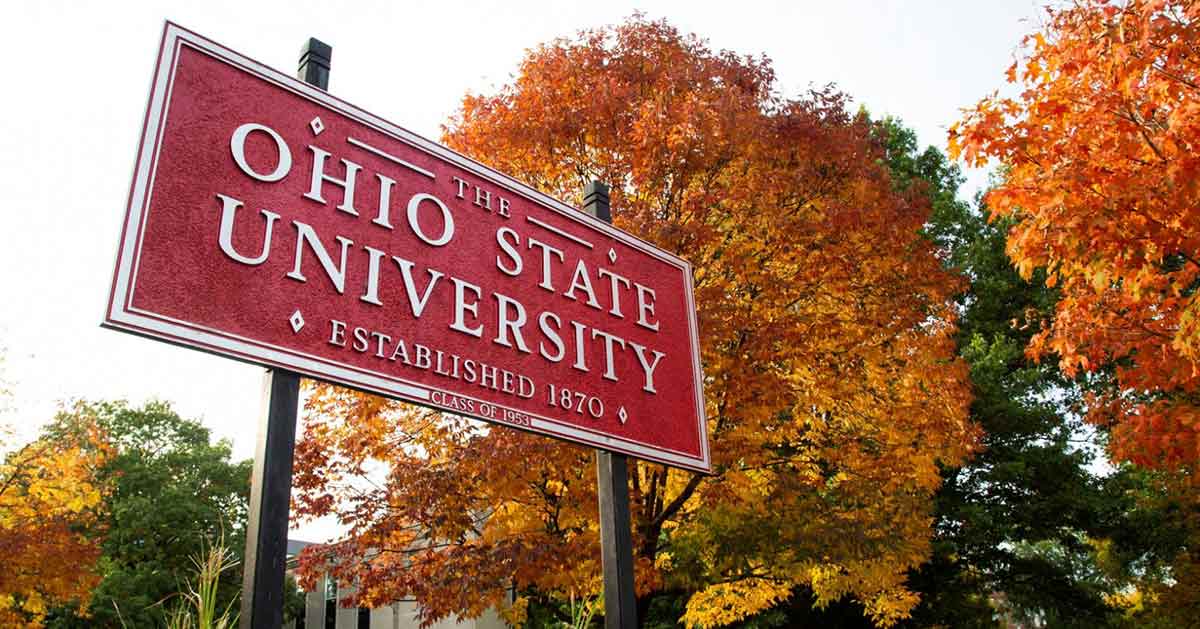
The Ohio State University, established in 1891, is a public land-grant research university. The ABA-accredited university is known for its rigorous academic program and the pioneering research of its world-class faculty. The Ohio State University Moritz College of Law offers a robust and diverse JD program designed to prepare students for successful careers in law. The program requires full-time attendance with no options for part-time or night classes. Students engage in a rigorous curriculum that includes foundational courses in the first year and numerous electives in subsequent years, allowing them to tailor their education to specific interests. The school offers 94 doctoral programs, 97 master’s programs, and countless opportunities for interdisciplinary work. The Moritz College of Law has an acceptance rate of 33.1%, reflecting its competitive admissions process. The median LSAT score is 165, and the median GPA is 3.83 for the incoming class of 2024. The metrics indicate the high academic standards maintained by the college.
Tuition at the Moritz College of Law is $34,588 annually for Ohio residents and $49,840 for non-residents. The total cost of attendance, including books, supplies, housing, meals, and miscellaneous expenses, brings the overall annual expense to approximately $58,400 for residents and $73,652 for non-residents. The law school’s ranking is 82nd among the best law schools in the nation. The law school is notable for its legal writing (ranking 26th), trial advocacy (ranking 27th), and tax law (ranking 62th). The Moritz College of Law offers specialized programs in sports law, providing students with a robust curriculum that covers various aspects of sports and entertainment law. The specialized program includes courses in contract negotiation and sports management, tailored to meet the needs of students interested in pursuing careers in the sports industry. Dual-degree options like the JD/MS in Sport Management further enhance the educational opportunities available to students at Moritz. Faculty expertise in sports law at Moritz is significant, with professors bringing a wealth of practical experience and academic knowledge to the classroom. Faculty members are involved in cutting-edge research and frequently contribute to national discussions on sports law issues. Clinical opportunities at the Moritz College of Law provide students with hands-on sports law experience. The college’s clinical programs allow students to represent clients under the supervision of experienced faculty, offering practical training in legal settings. The school offers eight clinics, allowing students to benefit from experiential learning opportunities.
The Ohio State University Law boasts a robust alumni network, which is particularly valuable for students pursuing careers in sports law. The alumni network includes prominent figures in the sports industry, offering mentorship and career opportunities. Santonio Holmes, a former NFL wide receiver and Super Bowl MVP, is a notable alumnus. Brian Sandoval, another alumnus, is a former governor of Nevada and a prominent legal professional. Course offerings in sports law at Moritz College of Law are comprehensive among the top law schools in Ohio. Students take courses in sports law, entertainment law, and intellectual property, ensuring a well-rounded education. The curriculum includes specialized courses like contract negotiation, sports management, and media law, tailored to prepare students for the complexities of the sports industry. Employment outcomes for sports law graduates from Moritz College of Law are strong, reflecting the program’s effectiveness. 89.8% of graduates secure positions with major sports organizations, law firms, and entertainment companies.
12. Thomas Jefferson School Of Law
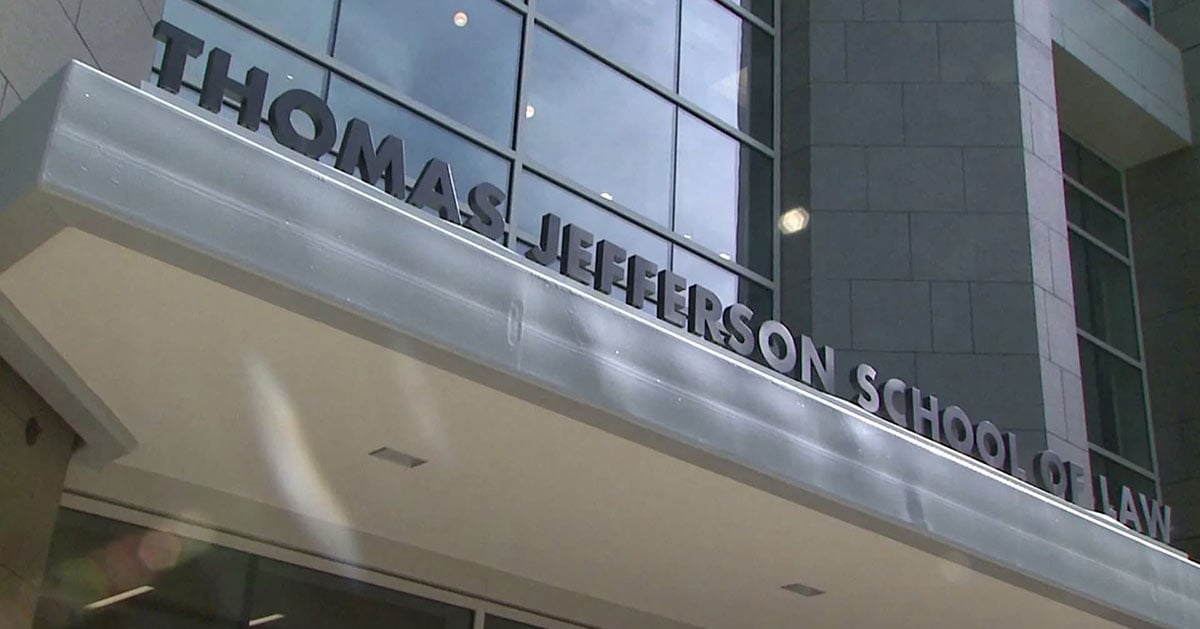
Thomas Jefferson School of Law, established in 1969, is located in San Diego, California. The private law school offers a Juris Doctor (JD) program designed to provide students with a solid foundation in legal principles. The law school provides various programs, including criminal law, intellectual property, entertainment, and sports law. The school provides traditional J.D., online J.D., and LLM programs. Students benefit from small class sizes and personalized attention from faculty, fostering a supportive learning environment conducive to academic success and professional development. The acceptance rate at Thomas Jefferson School of Law stands at approximately 50%, making it moderately competitive. The median LSAT score for admitted students is 147, with a GPA range between 2.53 and 3.09. The statistics reflect the school’s commitment to offering opportunities to a diverse range of applicants while maintaining certain academic standards. Tuition for the JD program at Thomas Jefferson School of Law is $38,400 for the 2024 academic year, marking a 9.71% increase from the previous year. The cost applies to in-state and out-of-state students as the institution is private.
Thomas Jefferson School of Law, located in San Diego, California, holds a distinctive position in legal education with its ranking of 142 in national universities. The law school offers specialized programs in sports law, primarily through the Intellectual Property, Entertainment, and Sports Law Fellowship Program. The fellowship provides students with unique experiences and opportunities that enhance their ability to pursue careers in the fields. The program covers essential skills needed for practice and offers networking opportunities with industry professionals. Faculty members have represented high-profile clients and have been involved in significant legal matters, providing students with valuable insights into the industry. Professors like Steven Semeraro and Randy Grossman bring a wealth of practical knowledge and experience, enriching the educational experience by bridging the gap between theory and practice.
Clinical opportunities for students interested in sports law are robust at Thomas Jefferson School of Law. The school hosts the annual National Sports Law Negotiation Competition, which simulates real-world sports law issues for students to negotiate. The competition attracts teams from various law schools across the United States and Canada, providing a platform for students to hone their skills and network with professionals. Thomas Jefferson Law’s networking and alumni connections in sports law are strong, fostering professional growth and opportunities for students. The Center for Sports Law and Policy (CSLP) regularly hosts events, including the National Sports Law Negotiation Competition, which draws participants from law schools across the United States and Canada. The events allow students to interact with professionals and alumni, building a network crucial for career advancement. Course offerings in sports law at Thomas Jefferson School of Law are comprehensive and designed to provide students with a robust understanding of the field. The curriculum includes specialized courses in contract negotiation, intellectual property, athlete representation, and sports ethics. Employment outcomes for graduates specializing in sports law from Thomas Jefferson Law show promising prospects, although they reflect the broader challenges of the legal job market. The Career Services Center supports students with job placement assistance, resume workshops, and networking events. Graduates have secured positions in sports agencies, compliance roles within sports organizations, and legal departments of sports-related companies.
13. Tulane University School Of Law
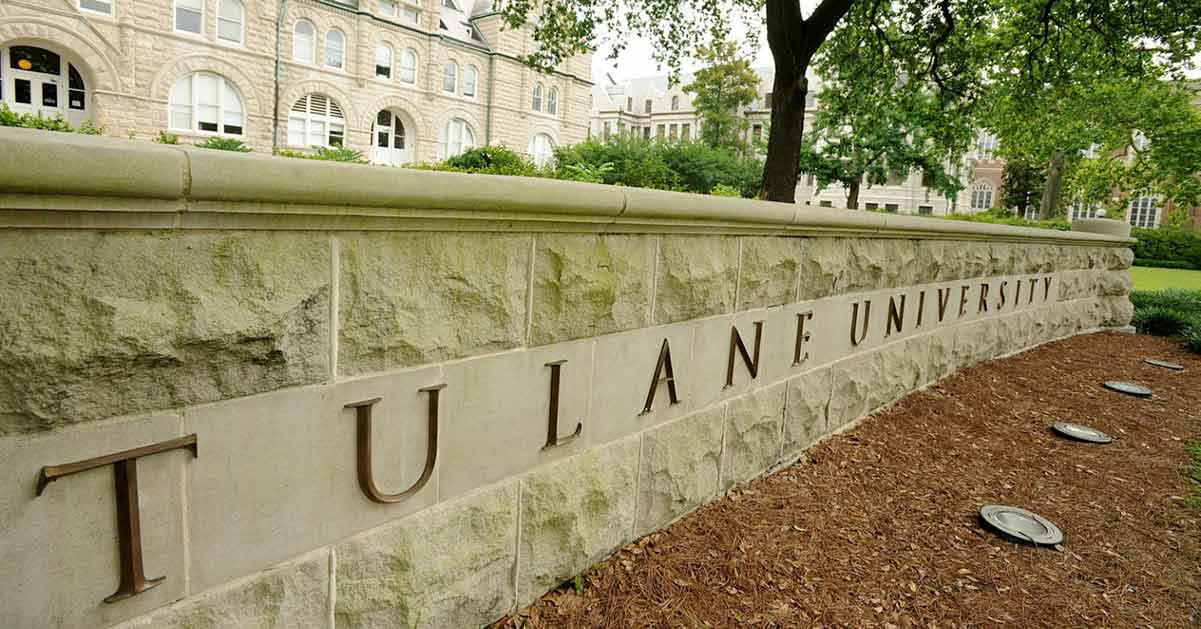
Tulane University Law, established in 1847, is the 12th oldest law school in the United States. The school is located in New Orleans, Louisiana, one of the most vibrant cities. The school offers a comprehensive Juris Doctor (JD) program designed to prepare students for diverse legal careers. Students specialize in areas like environmental law, maritime law, sports law, and international law, reflecting Tulane’s strength in the fields. Experiential learning is a cornerstone of the program, with opportunities for students to participate in clinics, externships, and moot court competitions. Tulane University Law School has an acceptance rate of approximately 48%, indicating a moderately competitive admissions process. Applicants are evaluated on their LSAT scores, undergraduate GPA, personal statement, and letters of recommendation. Tuition for the JD program at Tulane University Law School is $66,264 for the 2024-2025 academic year. Additional mandatory fees amount to $4,908, bringing the total for tuition and fees to $71,172.
Tulane Law is ranked 78th nationally, according to U.S. News and World Report. The law school, in addition, is ranked 28th in business/ corporate law, 34th in criminal law, and 36th in commercial law in the nation. The Sports Law Program at Tulane University Law School is one of the most comprehensive and renowned specialized programs in the country. Tulane was the first law school to offer a certificate in sports law, emphasizing the importance of understanding legal and business challenges in the sports industry. The program includes courses on antitrust, labor law, and intellectual property in the sports industry. The curriculum integrates academic studies with practical training, preparing students for careers in the sports industry by equipping them with the necessary legal and business skills. Faculty expertise in sports law at Tulane is led by Professor Gabe Feldman, a nationally recognized expert in the field. Feldman has extensive experience in sports law and is frequently sought after for his insights on player discipline, college athletes’ rights, and sports gambling legalization. Faculty members bring real-world experience to the classroom, providing students with valuable perspectives.
Clinical opportunities in sports law at Tulane Law are abundant, offering students hands-on experience through various competitions and externships. The law school hosts the National Baseball Arbitration Competition and the Professional Football Negotiation Competition, which simulate real-world legal scenarios. Tulane University Law School boasts a robust network and an active alumni community, especially in the field of sports law. The Sports Law Society at Tulane provides students with opportunities to connect with alumni and professionals through events, mentorship programs, and networking sessions. Prominent alumni, including Gabe Feldman, director of the Sports Law Program, frequently engage with students, offering guidance and opening doors to various opportunities. Tulane’s Sports Law Program offers a comprehensive curriculum that includes courses on antitrust, labor law, intellectual property, and specific sports law classes taught by experienced faculty. The program allows students to earn a Certificate of Concentration in Sports Law, providing specialized knowledge and skills. The course offers first-year students the opportunity to write on the “Sports Lawyer,” a monthly electronic newsletter, and the “Sports Law Weekly,” a weekly electronic newsletter. Employment outcomes for graduates of Tulane’s Sports Law Program are promising, with 88.4% securing roles in major sports organizations, law firms, and entertainment companies. The strong alumni network and the school’s reputation in sports law enhance employment prospects.
14. University Of Georgia School Of Law
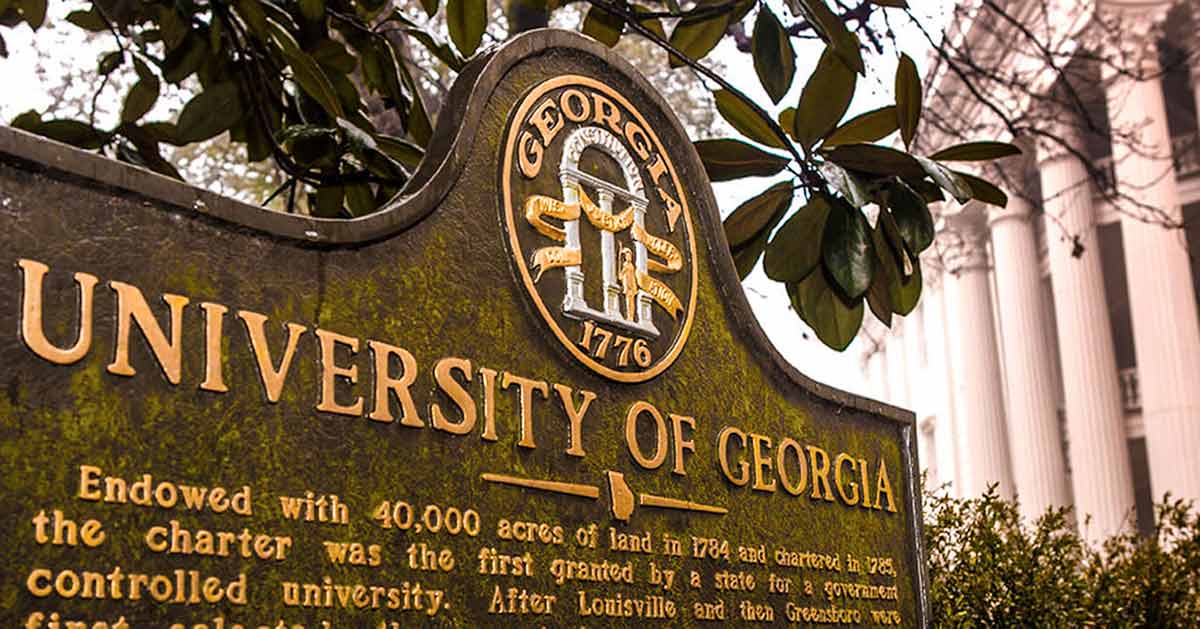
The University of Georgia Law, a public research university, is situated in Athens, Georgia. The school was founded in 1859 and recognized as one the best top-value law schools in the nation. The institution offers a comprehensive Juris Doctor (JD) program, MSL (master in legal studies), and LLM programs designed to prepare students for successful careers in various legal fields. The law school offers joint degree programs and certificates in specialized areas, including environmental law, public interest law, and sports law, enhancing the educational opportunities available to students. The acceptance rate at the University of Georgia School of Law is approximately 14.8%, making it a highly competitive law school. Tuition for the JD program at the University of Georgia School of Law is $18,994 per year for Georgia residents and $37,752 for non-residents. 92% of full-time students receive grants or scholarships, with an average grant amount of $10,862.
The University of Georgia School of Law is well-regarded for its strong academic reputation and high Bar passage rates. The school is ranked 20th among the top public law schools in the United States for its rigorous academic programs and emphasis on experiential learning. The school’s notable rankings include 20th in international law, 28th in business law, and 29th in commercial law. The school offers specialized programs in sports law among the top law schools in Georgia, enhancing its academic offerings. The programs include courses on contract negotiation, sports management, and legal issues in sports. The law school provides opportunities for students to engage in practical learning experiences, such as internships and externships with sports organizations. Faculty expertise in sports law at the University of Georgia School of Law is notable, with professors who bring significant professional experience and academic knowledge to the classroom. Faculty members have backgrounds in practicing law in various sports contexts, contributing to a rich educational experience for students.
Clinical opportunities in sports law at the University of Georgia School of Law provide students with hands-on experience through various programs. The clinics and externships allow students to work on real-world legal issues under the supervision of experienced faculty. The University of Georgia School of Law offers strong networking and alumni connections, especially in sports law. Notable alumni include Kim King, a former NFL player and successful attorney, and Sally Yates, former Acting U.S. Attorney General. The Sports & Entertainment Law Society provides students with numerous opportunities to engage with professionals and alumni through conferences, round-table discussions, and networking events. The organization plays a crucial role in fostering connections that lead to internships and job placements. Course offerings in sports law at the University of Georgia School of Law are extensive and designed to equip students with the necessary knowledge and skills for a career in the field. The curriculum includes courses on sports contracts, sports management, stadium-development transactions, labor and employment issues, insights into broadcasting and media agreements in sports, athlete representation and agency law, and legal issues in sports.
15. University Of Miami School Of Law
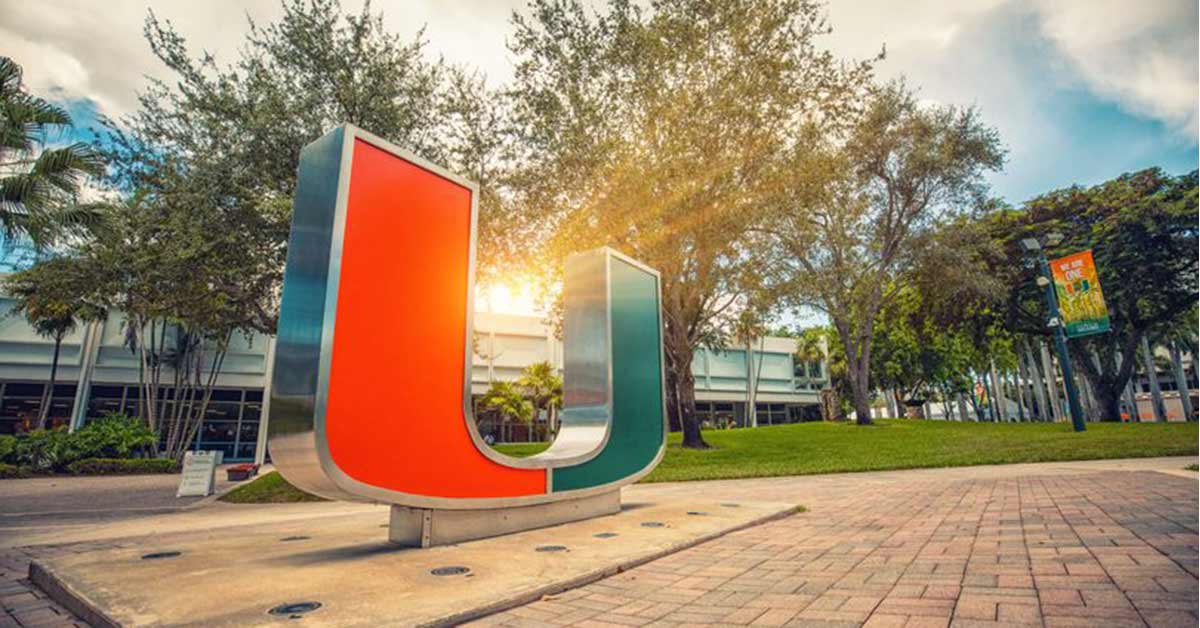
The University of Miami School of Law, located in Coral Gables, Florida, is a notable private research university. The university, established in 1926, is the oldest law school in South Florida. The law school offers various law programs, including J.D. in 18 areas of legal study and LLM in 8 areas. Miami Law, in addition, offers advanced degrees like the Master of Laws (LLM) and Doctor of Juridical Science (SJD). The acceptance rate at the University of Miami School of Law is approximately 32.9%, reflecting a moderately competitive admissions process. Tuition for the JD program at the University of Miami School of Law is $63,506 per year. Additional costs, including living expenses, books, and different fees, bring the total cost of attendance to approximately $100,000 annually. Financial aid is available through merit-based scholarships and need-based grants, with about 68% of students receiving several forms of scholarship aid.
Miami Law School ranks 82nd among the top law schools, with particular recognition in clinical training and international law. The U.S. News & World Report ranked Miami Law 29th in international law, 30th in clinical training, and 40th in tax law, highlighting its strong commitment to experiential learning and global legal perspectives. Miami Law offers a specialized LL.M. program in Entertainment, Arts, and Sports Law, highly ranked for its comprehensive curriculum and industry connections. The specialized sports law program prepares students for various roles within the sports industry, including representing athletes, leagues, and sports organizations. The law school’s active Sports and Entertainment Law Society enhances the learning experience through events and symposiums, fostering industry engagement and practical insights. Faculty expertise in sports law at Miami Law is notable, with distinguished professors and practitioners contributing to the program. Faculty members like Peter Carfagna, Co-Director of the Sports Law Track, bring extensive experience and knowledge to the classroom. The Board of Advisors includes prominent industry figures, including Kim Miale, NFL Agent and General Counsel at Roc Nation Sports, and Myles Pistorius, General Counsel for the Miami Dolphins.
Clinical opportunities for sports law students at Miami Law are extensive and highly regarded. The law school offers various clinics where students gain hands-on experience, including the Immigration Clinic and the Health Rights Clinic. The clinics provide students with the opportunity to represent real clients under the supervision of experienced attorneys. Externships and practicum placements with organizations like NBC Sports, Charlotte Hornets, and Minnesota Vikings, in addition, offer practical training and valuable industry exposure. Networking and alumni connections at the University of Miami School of Law are strong, particularly in the field of sports law. The school’s Sports and Entertainment Law Society provides numerous opportunities for students to connect with industry professionals and alumni. Regular networking events, mentorship programs, and guest lectures by prominent figures in sports law enhance students’ professional networks. The University of Miami School of Law’s course offerings in sports law are extensive. The curriculum includes courses on antitrust, labor law, intellectual property, and specific sports law topics like negotiation and drafting sports venue agreements and the purchase and sale of a minor league baseball team. The program, in addition, offers practical experiences through externships and practicums with organizations such as Roc Nation, NBC Sports, and the Miami Dolphins. The blend of theoretical knowledge and practical skills ensures that students are well-prepared for the legal complexities of the sports industry. Employment outcomes for sports law graduates from the University of Miami School of Law are promising, with 83.8% securing positions in major sports organizations, law firms, and entertainment companies. The Career Development Office provides extensive support, including job placement assistance, resume workshops, and interview preparation in the sports industry.
16. University Of Mississippi School Of Law
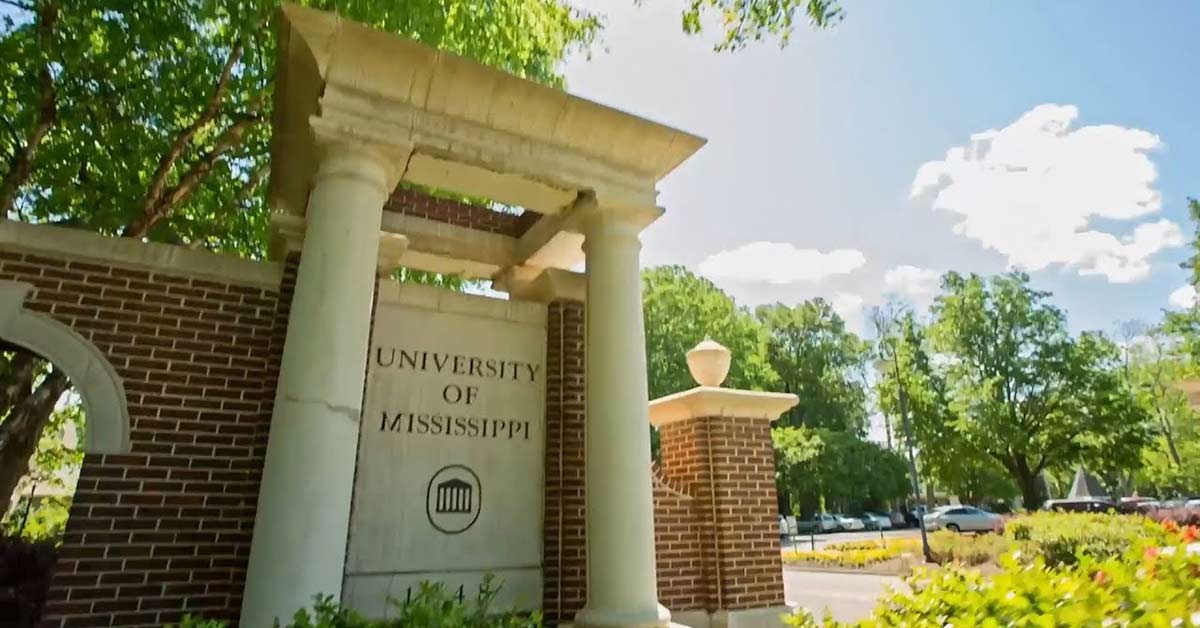
Ole Miss Law School, formally the University of Mississippi School of Law, is a public law school in Oxford, Mississippi. The school was founded in 1854 and is the oldest law school in the state. The ABA-accredited school has a rich history. Various programs are offered at the University of Mississippi Law School, reflecting multiple interests and career goals. The school offers a Juris Doctor (JD), a Master of Laws (LL.M) in Air and Space Law, and four concentration programs in Business Law, Criminal Law, Air and Space Law, and Sports and Entertainment Law. The programs are designed to provide students with a comprehensive understanding of the law. The Ole Miss Law’s acceptance rate currently stands at approximately 43.5%, reflecting a competitive admission landscape. Prospective students who enter Ole Miss Law School must meet certain academic requirements. A competitive LSAT score ranges from 152 to 159 (25th-75th percentile), which aligns with the law school’s commitment to upholding high educational standards. The law school’s tuition fee for full-time students is $18,470 (in-state) and $38,880 (out-of-state). The fees reflect Ole Miss Law School’s commitment to offering quality education at an affordable cost. The application fee for admission to the school is $40. The institution is ranked 120th in best law schools according to the U.S. News & World Report and consistently outperforms different law schools in the state in various national rankings. The school is ranked 78th in Constitutional Law, 80th in Criminal Law, and 116th in Commercial Law.
The University of Mississippi Law offers a specialized Sports and Entertainment Law Concentration designed to prepare students for legal careers in dynamic fields. Students must fulfill intensive credit hours through externships or individual studies related to sports or entertainment law. The program equips students with theoretical knowledge and practical skills essential for success in competitive sports and entertainment. Faculty expertise in sports law at the University of Mississippi Law School is significant, featuring professors with extensive experience and academic backgrounds in sports and entertainment law. Faculty members contribute to the Mississippi Sports Law Review, a student-run journal that addresses current legal issues in collegiate and professional sports. Will Berry, a notable faculty of sports law for more than a decade, is a Secretary to the American Association of Law Schools Section on Law and Sports. Professor Roy Rychalk is a faculty of Athletics Representative.
Clinical opportunities at the University of Mississippi Law School are abundant and designed to provide hands-on experience in sports law. Students participate in externships with sports organizations, gaining practical experience in real-world legal settings. Mississippi School of Law, being one of the top law schools in Mississippi, offers robust networking opportunities and an active alumni network in sports law. The Mississippi Sports Law Review and the Mississippi Sports Law Society play key roles in connecting students with industry professionals and alumni. Regular events, panel discussions, and symposia hosted by the organizations provide students with valuable opportunities to engage with practitioners and build professional relationships. The law school has numerous notable alumni, including Patrick Willis, a former NFL linebacker and Pro Football Hall of Famer, and Trent Lott, a former U.S. Senator who played a significant role in American politics. Course offerings in sports law at the University of Mississippi Law are extensive and designed to provide a comprehensive education. The curriculum includes core courses, including Sports Law I and II, Entertainment Law, and Intellectual Property. Elective courses like gaming law and trademark law, as well as various intensive credit hour opportunities through externships and individual studies, enrich the program. The diverse array of courses ensures that students gain theoretical knowledge and practical skills, preparing them for the complex legal landscape of the sports industry. Employment outcomes for graduates specializing in sports law from the University of Mississippi School of Law are promising. 83.8% secure positions with sports organizations, law firms, and entertainment companies. The school’s graduate’s Bar passage rate is 64.9% for the first time.
17. University Of New Hampshire Franklin Pierce School Of Law
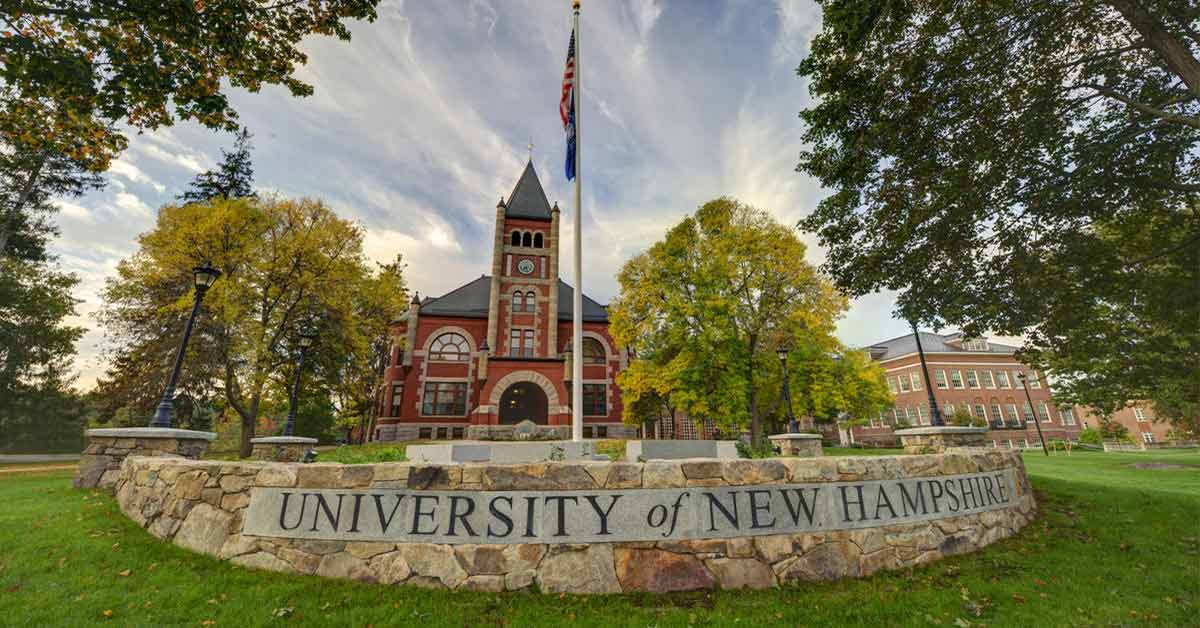
The University of New Hampshire Law School is situated in Concord, the state capital, providing students access to various legal and governmental opportunities. The University of New Hampshire Franklin Pierce School of Law has held accreditation from the American Bar Association (ABA) since 1974. The University of New Hampshire Law offers diverse law degrees and dual and specialized programs. The primary programs in law include the Juris Doctor (JD), which is required for practicing law in the United States, and the Hybrid JD Program. Dual degree programs enable students to earn a JD and another degree from the University of New Hampshire, including a JD/MBA, JD/MSW, or JD/MPP. New Hampshire Law has an acceptance rate of approximately 44% for the 2024 academic year. The average LSAT score for enrolled students is 156, with the 25th percentile at 154 and the 75th percentile at 160. The average undergraduate GPA is 3.48, with the 25th percentile at 3.22 and the 75th percentile at 3.71. The 2023-2024 tuition fees at the law school are $40,320 for residents and $48,320 for out-of-state students. The total cost of attendance, including tuition, living costs, and personal expenses, is $60,142 for NH residents and $68,142 for out-of-state students.
The University of New Hampshire Law School ranks No. 98 in the US, and the part-time program ranks No. 51. The law school excels in Intellectual Property Law (ranks 18th), while Clinical Training, Constitutional Law, and Contracts/Commercial Law ranks 129th, 139th, and 120th, respectively. New Hampshire Franklin Law offers a specialized Sports and Entertainment Law Program, preparing students for careers in sports law. The program includes core courses, including sports law, entertainment law, and intellectual property. Electives and workshops cover topics like sports marketing, sports contracts, and legal issues in sports. The curriculum aims to provide a comprehensive understanding of the legal and business aspects of the sports industry. Faculty expertise in sports law at UNH Franklin Pierce is notable, with accomplished professors who bring extensive professional experience to the classroom. The program is led by Michael McCann, a well-respected figure in sports law. Faculty members regularly contribute to the UNH Sports Law Review, addressing current legal issues in sports and entertainment.
Clinical opportunities at UNH Franklin Pierce School of Law provide students with hands-on experience in sports law. The Sports and Entertainment Law Institute offers various externships and legal residencies where students work with sports organizations, gaining practical experience. Clinics, including the Intellectual Property and Transaction Clinic, allow students to handle real cases under faculty supervision. The University of New Hampshire Law School offers strong networking and alumni connections, particularly in sports law. The Sports and Entertainment Law Institute frequently hosts events, conferences, and panels featuring prominent figures in the sports industry. The institute provides students with ample opportunities to connect with professionals. Notable alumni, including successful attorneys and industry leaders, actively engage with current students through mentorship programs and networking events. Course offerings in sports law at UNH Franklin Pierce are comprehensive and designed to equip students with theoretical and practical knowledge. The curriculum includes core courses such as Sports Law, Entertainment Law, and Intellectual Property, alongside electives that cover topics like sports marketing and contract negotiation. Employment outcomes for graduates specializing in sports law from UNH Franklin Pierce are promising, with many securing positions in major sports organizations, law firms, and entertainment companies. The Bar passage rate for first-time takers is 84.52%, well above the national average of 68.32%. Students at UNH Franklin Pierce benefit from strong job placement rates. The employment rate for graduates within ten months of graduation is around 90%. The strong alumni network and the school’s reputation in sports law further enhance employment prospects.
18. University Of North Carolina School Of Law
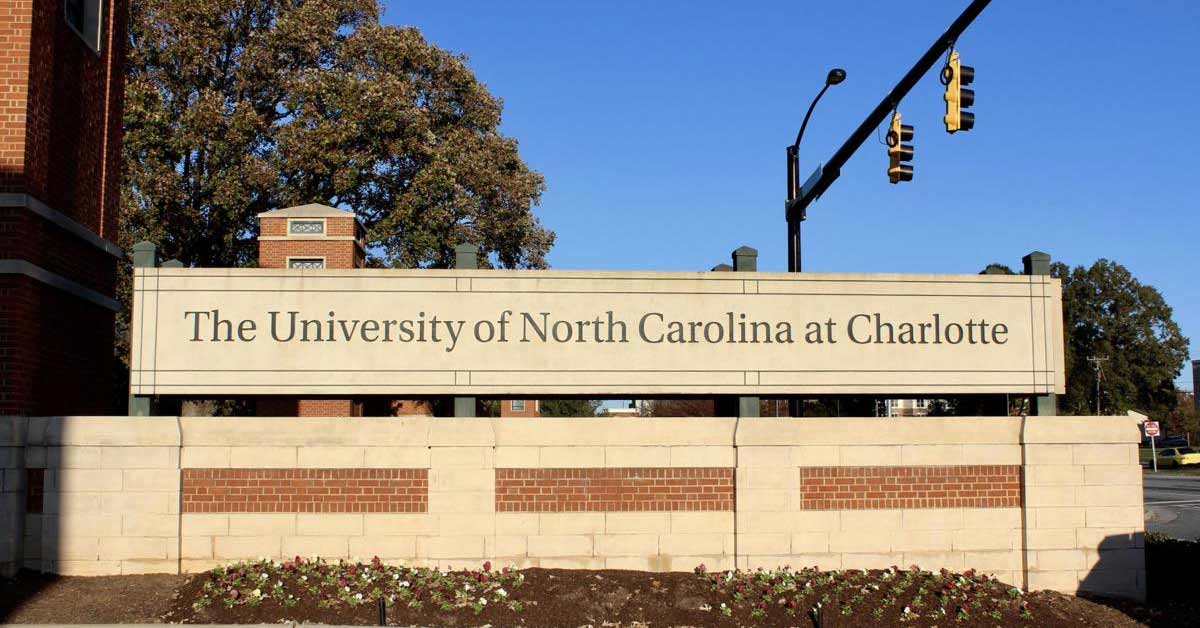
The University of North Carolina at Chapel Hill, established in 1789, is one of the oldest public universities in the United States and boasts a rich tradition of academic excellence. North Carolina Law provides unparalleled legal education with over 100 externships, ten clinical programs, six journals, and 50+ student organizations. The school offers a comprehensive Juris Doctor (JD) program designed to prepare students for various legal careers. The curriculum covers foundational courses in the first year, followed by various electives and specialized courses. The law school, in addition, provides ten dual-degree programs. The acceptance rate at the University of North Carolina School of Law is approximately 16.3%, indicating a highly competitive admissions process. The median LSAT score for incoming students of the academic year of 2023-24 was 166, with a median undergraduate GPA of 3.78. Tuition for the JD program at the University of North Carolina School of Law is $27,992 per year for North Carolina residents and $48,204 for non-residents. Financial aid is available through grants, loans, and scholarships, with a significant portion of students receiving different forms of financial assistance.
The school consistently ranks among the top public law schools in the United States, offering a supportive and collaborative learning environment. NC Law is currently ranked 20th in the best law schools nationwide. The school, in addition, is ranked 20th in tax law, 22nd in business law, and 23rd in clinical training. NC Law offers a robust program for students interested in sports law. The curriculum includes courses like Sports Law, Entertainment Law, and Intellectual Property, providing a comprehensive understanding of legal issues in the sports industry. Students engage in dual degree programs, including the JD/MA in Sports Administration, which combines legal education with sports management training. The specialized program ensures a well-rounded preparation for careers in sports law. Faculty expertise in sports law at UNC is significant among the top law schools in North Carolina. Faculty members contribute to the field through research, publications, and active participation in sports law conferences. Clinical opportunities at UNC Law provide students with hands-on experience in sports law. The Sports and Entertainment Law Society and various clinics, including the Intellectual Property Clinic, allow students to work on real cases under the supervision of experienced attorneys.
Networking and alumni connections at UNC Law are robust, particularly in the sports law sector. The Sports and Entertainment Law Society hosts events, panel discussions, and networking sessions that connect students with industry professionals and successful alumni. Alumni play an active role in mentoring students, providing career guidance, and facilitating job placements. The school’s notable alumni include Howard N. Finkelstein, a prominent sports attorney, and James E. Holshouser Jr., former Governor of North Carolina. Course offerings in sports law at UNC Law are comprehensive, providing students with a well-rounded education in the specialized field. The curriculum includes core courses such as Sports Law, Entertainment Law, and Intellectual Property. Electives like Antitrust Law, Contract Drafting, and Negotiation further enrich the program. Employment outcomes for UNC Law graduates specializing in sports law are promising. Graduates generally secure positions with major sports organizations, law firms, and entertainment companies. The school’s Bar passage rate is 93.8% for first-time exam takers.
19. University Of Oregon School Of Law

The University of Oregon Law School, established in 1886, is situated in the state of Oregon. The University of Oregon joins the Association of American Universities ranks, recognized for the school’s robust research activities. The law school offers various law programs, including the Juris Doctor (JD) and LLM programs. The curriculum equips students with a comprehensive legal education and practical skills. The University of Oregon School of Law has an acceptance rate of 75.23% for the 2023-2024 academic year. Applicants need a median LSAT score of 158 to be considered for admission, which ranges between 155 and 160. The required median GPA for admission is 3.52. Tuition fees at the University of Oregon School of Law for the 2024-2025 academic year are $48,516 for Oregon residents and $60,414 for out-of-state students. The total cost of attendance, including room and board, books, and different personal expenses, averages around $21,168. Oregon Law’s 139-year legacy as a leader in legal education continues as a top-tier public law school, ranking 82th overall in the 2024-2025 US News & World Report law school rankings. The school is ranked 1st in legal writing, 7th in environmental law, and 11th in dispute resolution.
The University of Oregon School of Law offers specialized programs in sports law, particularly through its Oregon Summer Sports Law Institute (SSLI). The SSLI is a renowned institute among the top law schools in Oregon. The SSLI provides a comprehensive curriculum covering various legal topics relevant to sports law, including antitrust, labor law, intellectual property, NCAA compliance, and Title IX. The intensive five-week program attracts students from various law schools and features guest speakers from around the world, offering theoretical knowledge and practical insights into the sports industry. Faculty expertise in sports law at the University of Oregon is significant, with professors like Ryan Gauthier and Robert Illig leading the program. The faculty members bring extensive experience and a deep understanding of sports law to the classroom. Professor Gauthier focuses on areas like the Olympic Games and sports governance, while Professor Illig offers courses on sports licensing and international sports law. Clinical opportunities in sports law at the University of Oregon are robust, providing students with hands-on experience in various legal contexts. The school offers a Name, Image, and Likeness (NIL) clinic as part of its business law program, where students work directly with athletes and sports organizations on NIL-related legal issues. Externships and legal residencies with major sports brands like Nike and Adidas and professional sports teams provide practical training and professional development opportunities essential for a successful career in sports law.
Oregon Law offers robust networking and alumni connections, particularly in sports law. The Oregon Summer Sports Law Institute (SSLI) plays a significant role in connecting students with industry professionals and alumni. The institute hosts events, conferences, and panels featuring notable figures from the sports industry. The events provide students with valuable opportunities to engage with professionals and build their professional networks. The school’s notable alumni include Phil Knight, co-founder of Nike, and Ann Aiken, U.S. District Judge for the District of Oregon. Course offerings in sports law at the University of Oregon School of Law are comprehensive, providing a solid foundation for students interested in the field. The curriculum includes core courses, including sports law, entertainment law, and intellectual property. Students are allowed to take specialized courses like Antitrust Law and Legal Issues in Sports. Employment outcomes for graduates specializing in sports law from the University of Oregon are promising. The University showcases a Bar exam passage rate of approximately 85.1% among first-time test takers. The rate surpasses the state’s overall Bar passage rate of 81.8%, highlighting the effectiveness of law schools in Oregon in preparing their students for the Bar exam.
20. USF School Of Law
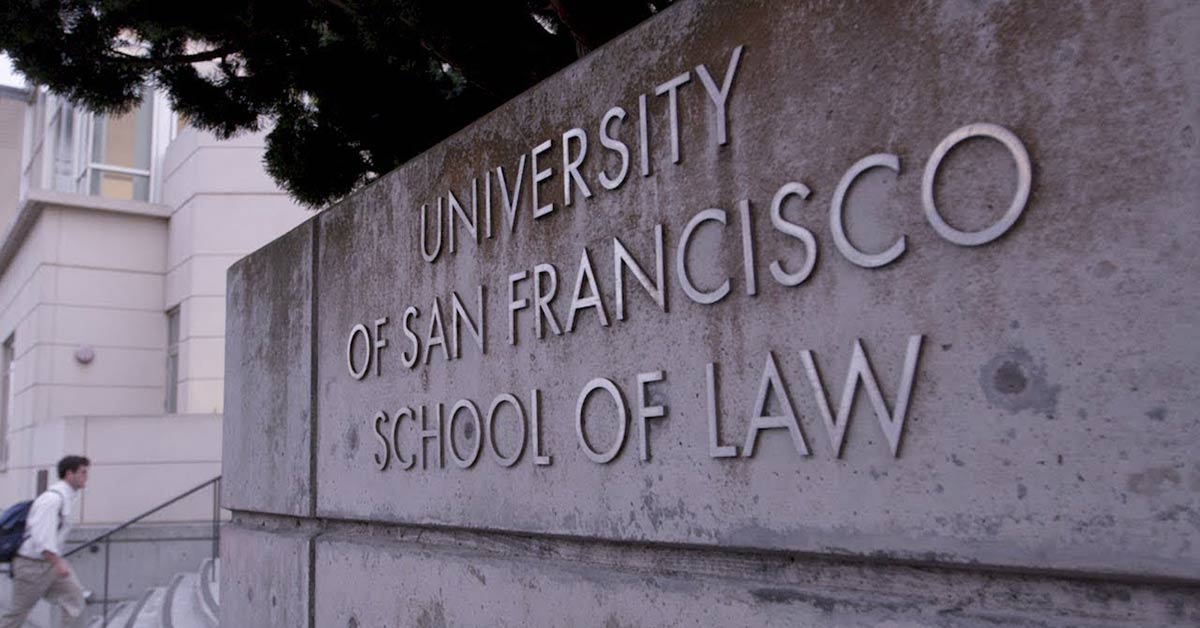
The University of San Francisco School of Law, established in 1912, is a private law school situated in San Francisco, California. The law school received American Bar Association accreditation in 1935 and joined the Association of American Law Schools in 1937. The institution offers a full menu of JD programs — full-time, part-time, and several joint degrees. USF Law, in addition, offers LLM and graduate tax programs, enhancing the educational experience and providing additional career opportunities. The acceptance rate at the University of San Francisco School of Law is approximately 55.23%, indicating a moderately competitive admissions process. The median LSAT score for incoming students is 153, and the median GPA is 3.46 for the academic year of 2023-24. The statistics reflect the school’s commitment to admitting a diverse and academically strong student body. Tuition for the JD program at USF Law is $55,290 per year. The average cost of living off-campus, including living expenses, books, and personal expenses, is estimated at $32,200 annually.
The University of San Francisco School of Law is well-regarded for its academic excellence and practical training. The law school ranks 165th among the top institutions for preparing students for legal practice. The school is ranked 81st in environmental law, 84th in international law, and 95th in clinical training. San Francisco School of Law offers a specialized program in Sports, Entertainment, and the Arts designed to prepare students for careers in the intersecting fields. Faculty expertise in sports law at USF Law is significant, with professors like Roy Eisenhardt, who has extensive experience in labor law and arbitration in professional sports. Faculty members bring practical experience and academic knowledge to the classroom, offering students insights into real-world legal challenges. Clinical opportunities at USF Law provide students with hands-on experience in sports law. The law school offers externships and practicums with organizations like Athletes First and BBC Worldwide Productions. The Internet and Intellectual Property Justice Clinic allows students to work on cases involving sports and entertainment law under faculty supervision.
Networking and alumni connections at USF Law are strong, particularly in the field of sports law. The Sports and Entertainment Law Society organizes events, panel discussions, and networking sessions that connect students with industry professionals and alumni. The events provide valuable opportunities for students to build their professional networks and gain insights from experienced practitioners. Course offerings in sports law include legal issues in sports, patent licensing, and monetization, as well as contract negotiations for professional and amateur sports teams and athletes. Course offerings, in addition, include intellectual property in the media and entertainment fields and beyond. Employment outcomes for USF Law graduates specializing in sports law are promising. The school’s graduation rate within ten months of graduation is 67.7%.
21. Vermont Law School
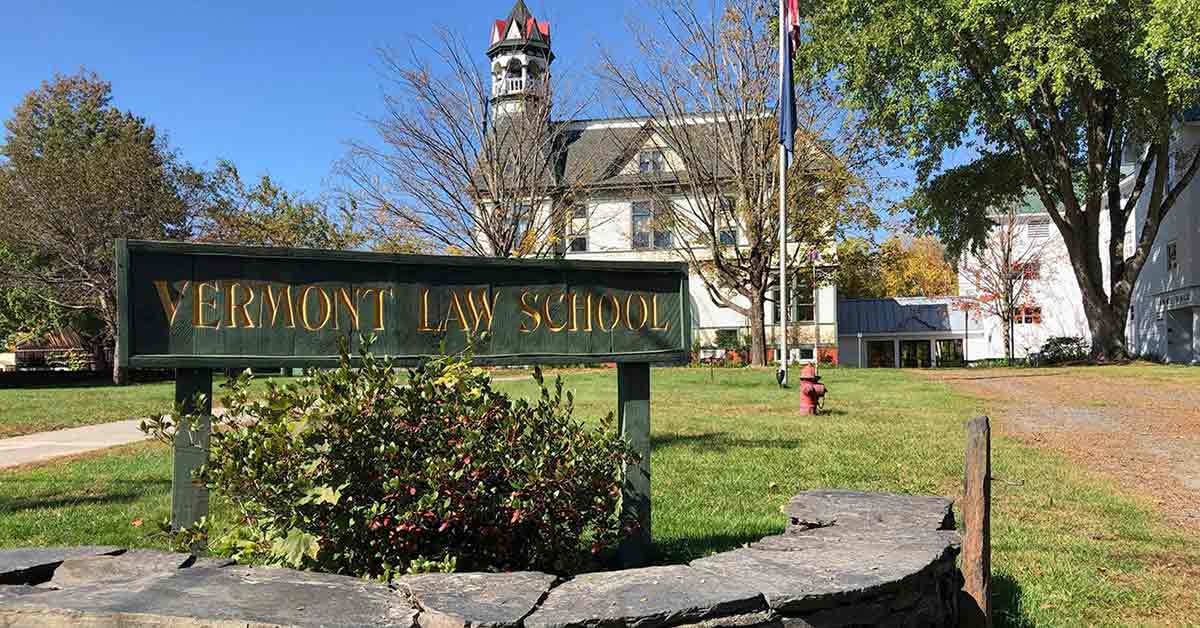
Vermont Law and Graduate School, known as Vermont Law School, established in 1972, is an ABA-accredited law school in Royalton. The school’s campus spans 13 acres near the White River and features buildings designed with environmental sustainability. Vermont Law and Graduate School offers a variety of law degrees of diverse interests and career paths. The JD program is the most popular law degree type, preparing students for general legal practice. The school provides LLM degrees and master’s degrees in environmental law and policy, allowing students to deepen their expertise in critical areas. The acceptance rate for Vermont Law School stands at approximately 64.2%, indicating a moderately selective admissions process. LSAT scores required for Vermont Law School range between 148 and 158. The school’s undergraduate GPA requirement is between 3.09 and 3.69. The tuition fee for the academic year 2024-2025 at Vermont Law and Graduate School is $53,768. The total cost of attendance, including living expenses, is approximately $76,140. Financial aid is available, with 100% of students receiving grants or scholarships.
Vermont Law School, overall, is ranked 164th by U.S. News & World Report among law schools in the United States. The law school’s clinical training program is ranked 80th nationally. The school offers a specialized Sports Law Institute (SLI), providing students with a comprehensive education in sports law. The program includes core courses, including Sports Law and Entertainment Law, alongside electives that cover various related topics. The curriculum aims to prepare students for the growing opportunities at the intersection of sports, law, and business. The Sports Law Institute engages in original research, promotes experiential learning, and connects students with academic and professional sports law activities. Faculty expertise in sports law at Vermont Law School is significant, with experienced professionals like Professor Michael McCann, a leading sports law expert and legal analyst for Sports Illustrated, heading the program. McCann’s extensive background in sports law and his involvement in high-profile cases provide students with valuable insights into the field.
Clinical opportunities at Vermont Law School are abundant, offering students hands-on experience in sports law. The Sports Law Institute facilitates externships and legal residencies with various sports organizations, allowing students to gain practical skills and professional exposure. Networking and alumni connections are strong at Vermont Law School, particularly through the Sports Law Institute. The institute organizes events, panel discussions, and conferences that connect students with industry professionals and successful alumni. Alumni play an active role in mentoring students, providing career guidance, and facilitating job placements. The connections are vital for building a professional network and gaining insights into the sports law field, enhancing students’ career prospects significantly. L. Douglas Wilder, the first African-American governor of Virginia, is a notable alumnus of the school. Jim Munsey, another notable alumnus, is an MLBPA-certified agent and President of Munsey Sports Management. Vermont Law School offers a comprehensive Sports Law Institute (SLI) designed to prepare students for careers in sports law. The course offerings include topics like Sports Law, Entertainment Law, and related electives. The curriculum aims to provide a solid foundation in legal principles specific to the sports industry. Employment outcomes for law school students are impressive, with a graduation rate of 84.9% within ten months of graduation. Sports law graduates are actively involved in sports clubs or associations.
22. Villanova University Charles Widger School Of Law
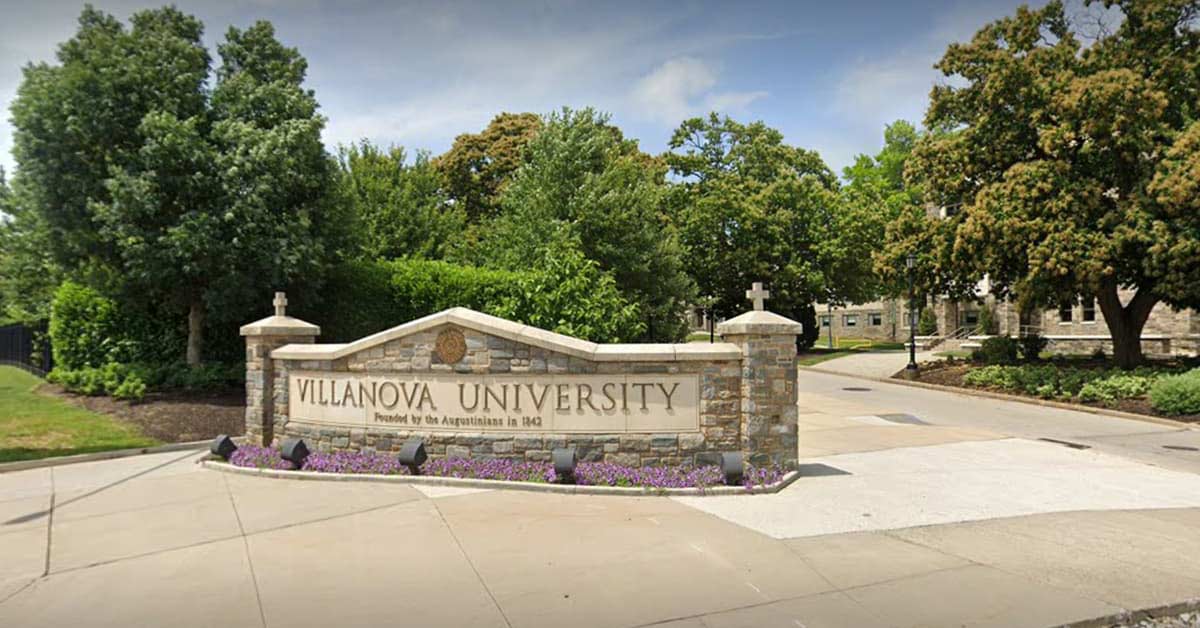
Villanova University Charles Widger School of Law is a public research university situated in Pennsylvania. The ABA-accredited law school, established in 1953, is a member of the Association of American Law Schools. The school offers various programs, including a comprehensive J.D. degree with five concentrations and 15 diverse focus areas. The law school, in addition, offers joint programs, including JD/MBA, JD/MPA, JD/LLM in taxation, and JD/LLM in international studies. Villanova Law School has a selective admissions process, with an acceptance rate of 22.5%. The median LSAT score for admitted students is 164, while the median GPA is 3.8. The figures indicate a competitive applicant pool, with successful candidates demonstrating strong academic credentials. The JD program enrolls around 553 students, contributing to a dynamic and collaborative learning environment. Tuition is approximately $58,615 annually for the 2024 academic year. Additional costs, including fees and living expenses, bring the total estimated cost of attendance to around $82,272 per year.
Villanova University Law’s ranking is 48th nationally, according to the U.S. News and World Report, 2024. The school ranks 36th in tax law, 42th in trial advocacy, and 46th in clinical training. Villanova Law offers a specialized program in sports law through the Jeffrey S. Moorad Center for the Study of Sports Law. The center, established in 2012, aims to prepare students for careers in amateur and professional sports by offering rigorous academic courses, innovative programs, and extensive internship opportunities. The program covers various aspects of sports law, ensuring students gain comprehensive knowledge and practical skills needed in the sports industry. Faculty expertise in sports law at Villanova is exemplified by Professor Andrew Brandt, who leads the Moorad Center. Brandt brings extensive experience from his career as an executive in the National Football League (NFL) and as an agent. Brandt’s work includes analyzing sports business trends and legal issues, which enriches the curriculum in sports law. Villanova Law provides substantial clinical opportunities in sports law, allowing students to gain hands-on experience. The Moorad Center offers internships with sports teams, leagues, and law firms specializing in sports law. Students participate in negotiation competitions, including the Tulane Professional Football Negotiation Competition, where students hone their advocacy and negotiation skills. Practical experience is crucial for understanding the complexities of sports contracts and legal disputes.
Villanova University Charles Widger School of Law excels in networking and alumni connections within the sports law field. The Jeffrey S. Moorad Center for the Study of Sports Law provides students with extensive networking opportunities. The center hosts events featuring industry leaders, facilitates internships, and supports the Sports Law Society, which connects students with alumni working in various sectors of sports law. The sports law program at Villanova Law includes comprehensive course offerings designed to equip students with the necessary skills and knowledge. Core courses cover contract drafting, legal and business aspects of sports, athlete representation, compliance issues, and negotiation techniques. The program offers specialized courses like advanced sports law contract drafting, which provide practical experience in handling sports-related legal issues. Employment outcomes for Villanova Law graduates specializing in sports law are promising. The school reports high employment rates of 92.4% for graduates, with many securing positions in prestigious law firms, sports agencies, and corporate legal departments.
Is Sports Law A Degree?
Yes, sports law is a degree. Universities offer sports law as a concentration within broader law or business degree programs. Institutions integrate sports law into Juris Doctor (JD) programs, allowing students to specialize by taking elective courses and participating in related clinics and internships. Master of Laws (LL.M.) programs frequently include a focus on sports law for students holding a primary law degree seeking advanced specialization. The programs provide a comprehensive understanding of legal issues in the sports industry, including contract negotiation, compliance, and dispute resolution.
Villanova University’s Jeffrey S. Moorad Center for the Study of Sports Law exemplifies the structure. The center offers a sports law concentration within the JD curriculum. Students engage in rigorous academic study, participate in externships with sports organizations, and compete in negotiation competitions. Harvard Law School, similarly, offers a robust sports law program through its JD curriculum. Students interested in sports law take courses like Sports and the Law, which explores legal issues related to professional and amateur sports. Arizona State University, in contrast, offers a Master of Sports Law and Business (MSLB), blending legal and business aspects of sports, preparing students for diverse roles in the sports industry. The programs highlight that while sports law is not an independent degree, specialized tracks within broader degrees effectively equip students for careers in the field.
How To Find A Strong Sports Law Program?
To find a strong sports law program, follow the five steps listed below.
- Research program reputation and faculty expertise. Start by researching the reputation and faculty expertise of law schools offering sports law concentrations. Look for programs led by renowned sports law experts with extensive industry experience. Consider programs where faculty actively engage in current legal issues and provide real-world insights.
- Evaluate course offerings. Examine the course offerings and curriculum of the sports law programs. Strong programs offer different specialized courses covering key areas like contract negotiation, compliance, and intellectual property. Look for programs that include practical components like mock negotiations, legal clinics, and externships, which are essential for hands-on learning and skill development.
- Assess Networking and alumni connections. Networking opportunities and alumni connections play a crucial role in finding a strong sports law program. Alumni involvement helps students build professional connections and gain insights from experienced practitioners.
- Consider location. The location of the law school and its connections to the sports industry significantly impact the program’s strength. Schools located in major sports markets offer access to numerous professional sports teams and events. The locations provide students with ample internship and job opportunities.
- Review employment outcomes and career support. Investigate the employment outcomes and career support services provided by the sports law programs. Strong programs boast high employment rates for graduates in reputable law firms, sports agencies, and corporate legal departments. Assess the success of alumni in securing positions in the sports law field and the availability of career counseling by the school.
What Is Sports Law?
Sports law is the collection of legal principles and regulations that govern the sports industry. The legal field encompasses various disciplines, including contract law, labor law, antitrust law, and intellectual property law, all applied within the context of sports. Sports law addresses issues related to professional and amateur sports, ensuring fair play, protecting the rights of athletes and organizations, and regulating commercial transactions within the sports industry. Sports law governs the legal relationships between athletes, teams, leagues, and governing bodies.
Sports law covers various topics, including anti-doping regulations, sports betting, and commercial rights. Anti-doping laws, enforced by bodies like the World Anti-Doping Agency (WADA), ensure fair competition by preventing the use of performance-enhancing drugs. Sports betting laws vary by jurisdiction, impacting how sports betting is regulated and conducted. Sports law, in addition, includes regulations on contracts, endorsements, and sponsorship deals, ensuring that all parties’ rights and obligations are clear and enforceable. Contract law within sports law, for example, covers player contracts, endorsement agreements, and sponsorship deals, ensuring compliance and resolving disputes. Labor law aspects address collective Bargaining, player unions, and employment conditions, providing a framework for negotiations and protecting athletes’ rights. Sports law, similarly, addresses intellectual property issues, protecting the use of trademarks, logos, and proprietary content related to sports events.
What Do Sports Lawyers Major In?
Sports lawyers major in various fields, including political science, business, or communications. The fields cultivate essential skills such as analytical thinking, effective communication, and a strong understanding of legal principles. Majoring in political science offers a deep dive into government systems and public policy, which is crucial for understanding the regulatory environment in sports. Business majors gain insights into corporate governance, finance, and contract management, all of which are relevant for handling sports law cases. Communications majors develop skills in media relations and public speaking, which are valuable for representing athletes and negotiating deals.
The best major for sports law is business. Business majors gain insights into corporate governance, finance, contract management, and organizational behavior. The areas directly apply to sports law, where understanding complex financial agreements, negotiating contracts, and managing the legal aspects of sports organizations is crucial. Business programs, in addition, emphasize critical thinking, analytical skills, and strategic decision-making, which are essential for legal practice. Courses in business law, ethics, and management provide a solid foundation for understanding the legal issues that sports lawyers frequently encounter.
How To Become A Sports Lawyer?
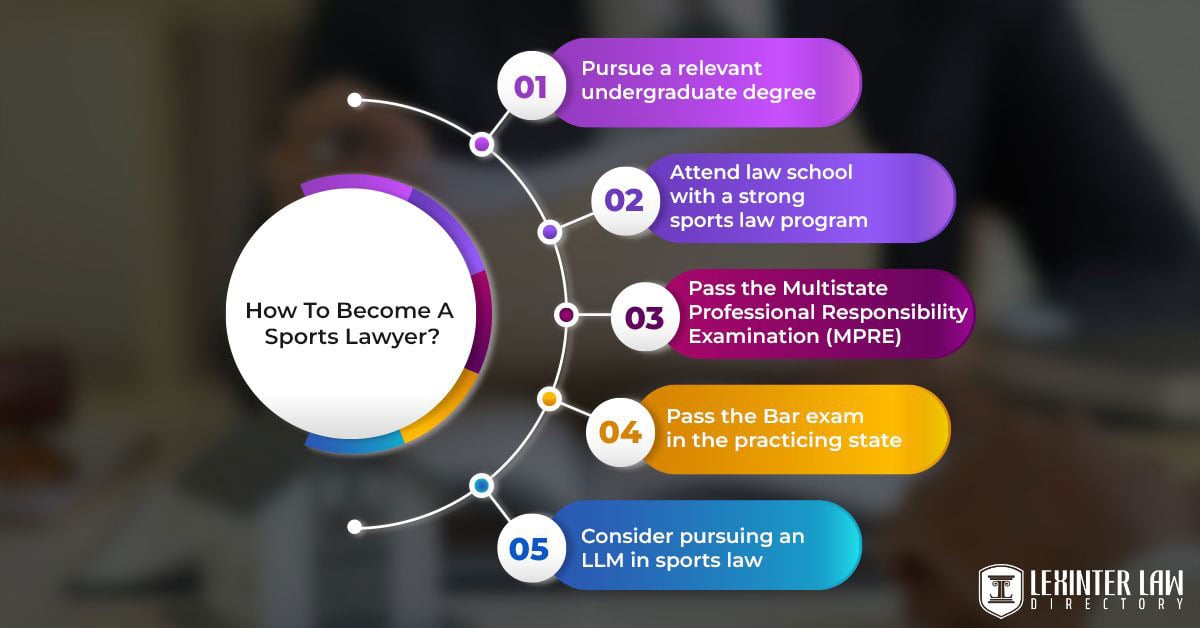
To become a sports lawyer, follow the five steps listed below.
- Pursue a relevant undergraduate degree. Obtain a Bachelor’s degree in fields like business, political science, or communications. Business majors gain skills in corporate governance, finance, and contract management, which are crucial for handling legal matters in sports. Political science provides insights into government systems and public policy, aiding in navigating the regulatory environment of sports law. Communications majors develop media relations and public speaking skills, which are valuable for representing athletes and negotiating deals.
- Attend law school with a strong sports law program. Enroll in a law school offering specialized sports law courses, including Tulane, Villanova, or ASU. Courses in contract law, labor law, intellectual property, and antitrust law equip students with the knowledge needed to address legal issues in sports. Participating in moot court competitions, sports law clinics, and internships provides practical exposure and enhances the student’s resume.
- Pass the Multistate Professional Responsibility Examination (MPRE). The MPRE assesses knowledge of professional ethics and conduct expected of lawyers. Topics include confidentiality, conflicts of interest, and interactions with clients and the legal system. Passing the MPRE is essential for Bar admission in most U.S. states. Thorough preparation using study guides, online practice exams, and review courses is recommended.
- Pass the Bar exam in the practicing state. The Bar exam tests knowledge of state-specific and general legal principles through essays, multiple-choice questions, and performance tasks. Comprehensive preparation, including enrolling in a reputable Bar preparation course, is essential. Passing the Bar exam certifies one’s legal acumen and skills, establishing credibility and trustworthiness as a sports lawyer.
- Consider pursuing an LLM in sports law. An LLM in sports law is optional to become a sports lawyer. An LLM in sports law, however, provides specialized training in legal aspects of the sports industry, including sports agent representation, antitrust law, and intellectual property. The advanced degree enhances expertise, making sports lawyers more effective and knowledgeable. Assessing the time and financial commitment involved in obtaining an LLM is crucial.
How Long Would It Take To Study Sports Law?
It would take approximately seven to eight years to study sports law, depending on the educational path chosen. Aspiring sports lawyers initially complete a four-year undergraduate degree in fields like business, political science, or communications. The majors provide essential foundational skills in critical thinking, legal principles, and effective communication, all crucial for a career in sports law. Students attend law school to earn a Juris Doctor (JD) degree after the undergraduate degree, which generally takes three years to complete. Choosing a law school with a robust sports law program, including schools offering courses in contract law, labor law, intellectual property, and antitrust law, is essential. Participating in moot court competitions, sports law clinics, and relevant internships during law school provides practical exposure and enhances the resume.
The duration of study of sports law generally takes seven to eight years, depending on additional specializations and practical experiences pursued. The completion of an undergraduate degree, followed by a JD degree, takes seven years to be completed. Aspiring sports lawyers must pass the Bar exam, which generally requires several months of dedicated study. Obtaining a Master of Laws (LLM) in sports law is optional but beneficial and generally takes an additional year. Sports lawyers, in addition, must keep themselves updated by continuing legal education (CLE) to increase their professional credentials.
Is The Sports Law Hard?
Yes, the sports law is hard. The field combines various legal specialties, including contract law, intellectual property, antitrust law, and labor law. Sports lawyers must deeply understand the areas to handle diverse legal issues effectively. Sports lawyers negotiate contracts, address labor disputes, manage intellectual property rights, and ensure compliance with regulations governing the sports industry. The interdisciplinary nature makes sports law demanding and complex. Sports law requires rigorous academic and practical preparation. Aspiring sports lawyers complete a four-year undergraduate degree, followed by three years in law school. Law students participate in moot court competitions, internships, and sports law clinics to gain hands-on experience. Extensive education and training are necessary to succeed in the competitive field of sports law.
The practical aspects of sports law present significant challenges. Sports lawyers work long hours, manage high-stakes negotiations, and handle complex legal disputes. Representing athletes, teams, or sports organizations requires excellent negotiation skills, thorough legal knowledge, and the ability to handle public relations issues. Networking is crucial for career advancement, as building a strong professional network leads to job opportunities and client referrals. The combination of extensive education, diverse legal expertise, and practical demands makes sports law a challenging and competitive field.
What To Expect From A Career As A Sports Lawyer?
One expects a demanding and multifaceted career as a sports lawyer. A sports lawyer is expected to engage in various legal disciplines, including contract law, intellectual property, antitrust law, and labor law. Handling complex negotiations, managing athlete contracts, and ensuring compliance with regulatory standards are general responsibilities. Sports lawyers must possess a deep understanding of the sports industry and excellent legal acumen to navigate the multifaceted challenges effectively. Working as a sports lawyer involves representing athletes and sports organizations. Representation includes negotiating contracts, handling endorsement deals, and resolving disputes. Sports lawyers generally work for law firms that provide services to sports entities.
An individual must expect a dynamic work environment as a sports lawyer where no two days are the same. Tasks range from contract negotiations to litigation and regulatory compliance. Sports lawyers generally work long hours and must be adept at managing public relations issues. Building a strong professional network is crucial for career advancement, as connections within the sports and legal industries lead to significant opportunities. Continuous learning and staying updated on industry trends are essential for success in the competitive field.
What Is The Difference Between A Sports Lawyer And A Contract Lawyer?
The difference between a sports lawyer and a contract lawyer is that sports lawyers specialize in legal issues specific to the sports industry, whereas contract lawyers focus on the negotiation and implementation of contracts. Sports lawyers handle matters like athlete representation, sponsorship deals, and disputes involving sports organizations. Contract lawyers, on the other hand, focus primarily on the creation, negotiation, and enforcement of contracts across various industries, ensuring that agreements are legally sound and enforceable. Sports lawyers must be well-versed in various legal disciplines, including antitrust law, labor law, and intellectual property law. The areas are crucial for handling the multifaceted legal challenges within the sports industry. Contract lawyers, skilled in contract law, do not necessarily need expertise in the specific regulations and industry norms that sports lawyers must understand. Contract lawyer’s work involves drafting, reviewing, and negotiating contracts, focusing on the legalities and terms applicable to general business transactions.
Sports law and contract law require specialized knowledge, but their focus and application differ significantly. Sports law is a specialized field encompassing various legal areas, while contract law is a fundamental legal area applicable across multiple fields. Sports law deals specifically with the sports industry, addressing unique issues like athlete representation and sports governance. Contract law, in contrast, applies broadly to any agreement between parties, regardless of the industry. Similarities between sports law and contract law include the fundamental skill of contract negotiation and enforcement. Contract formation, interpretation, negotiation, and enforcement skills are necessary in the fields of sports law and contract law. Sports lawyers, however, negotiate player contracts, endorsement deals, and sponsorship agreements. A contract lawyer negotiates terms and conditions of agreements in various sectors, ensuring their clients’ interests are protected. The two fields involve resolving disputes arising from contractual agreements and seeking similar legal remedies in case of contract breaches.
How Do Sports Lawyers Earn?
Sports lawyers earn primarily through salaries, commissions, and various forms of compensation tied to the legal services they provide. Sports lawyers working for law firms, sports teams, or agencies receive an annual salary. The average annual salary for sports lawyers in the United States generally ranges from $98,575 to $150,000, with top earners making over $200,000 annually. The salary varies based on factors like experience, location, and the employer.
Sports lawyers, in addition, earn commissions or percentages of the contracts they negotiate, apart from their base salaries. Lawyers receive a percentage of the value of endorsement deals, sponsorships, and different commercial agreements. The commission-based earnings model significantly boosts their income, especially when negotiating high-value contracts for top athletes. Sports lawyers, moreover, earn money through bonuses and performance incentives. The additional earnings are tied to the success of the deals they negotiate, their ability to secure favorable terms, or their overall contribution to their firm or agency. The total compensation package for sports lawyers generally includes bonuses, making the profession financially rewarding.
Is A Sports Law Attorney A High-Paying Job?
Yes, a sports law attorney is a high-paying job. Sports lawyers earn substantial incomes due to the high stakes and significant financial transactions involved in the sports industry. The average annual salary for sports lawyers ranges from $98,575 to $150,000, with top earners making well over $200,000 annually. Factors such as experience, location, and the specific sports clients they represent influence earnings. Sports lawyers earn through various means, including salaries, commissions, and performance bonuses. The lawyers receive a percentage of the contracts they negotiate for their clients, which significantly boost their income. Sports lawyers frequently earn bonuses tied to their performance and the success of the deals they secure.
The location and experience of a sports lawyer significantly affect their earnings. Lawyers in major cities like New York and Los Angeles tend to earn higher salaries due to the concentration of sports teams and agencies. Experienced sports lawyers with a proven track record of handling high-profile cases and securing significant deals command higher fees and salaries. Building a solid reputation and professional network within the sports law industry is crucial for maximizing earning potential in the high-paying field.
Is A Sports Law Attorney A High-Demand Job?
Yes, a sports law attorney is a high-demand job. The growing popularity and commercialization of sports drive the demand for specialized legal expertise. Sports lawyers handle contract negotiations, endorsement deals, regulatory compliance, and dispute resolution, making their services essential for athletes, teams, and sports organizations. The rise of new legal challenges, including NIL (Name, Image, Likeness) regulations and increased scrutiny over athlete rights, has further heightened the need for sports lawyers. Sports lawyers provide critical legal guidance on emerging issues, ensuring compliance with evolving laws and protecting clients’ interests. The dynamic environment continuously creates new opportunities for sports law professionals.
The growing popularity and commercialization of sports drive the demand for specialized legal expertise. Sports lawyers handle contract negotiations, endorsement deals, regulatory compliance, and dispute resolution, making their services essential for athletes, teams, and sports organizations. The rise of new legal challenges, including NIL (Name, Image, Likeness) regulations and increased scrutiny over athlete rights, has further heightened the need for sports lawyers. Sports lawyers provide critical legal guidance on emerging issues, ensuring compliance with evolving laws and protecting clients’ interests. The dynamic environment continuously creates new opportunities for sports law professionals.
How To Find A Good Sports Lawyer Near Me With Lexinter?
To find good sports lawyers near me with Lexinter, start by visiting Lexinter.net, the official website of the Lexinter Law Directory. Accessing the site directly ensures accurate and detailed information. Explore the “about us” section to understand the directory’s objectives and mission, highlighting Lexinter’s commitment to reliable attorney listings. Use the search feature on the homepage to find sports lawyers in an individual’s area. Individuals must enter the city and desired radius in miles and select the type of lawyer they need. Individuals must click the submit button to generate a list of available sports attorneys based on their criteria.
Lexinter is a valuable online resource for prospective individuals looking for the best sports lawyer in different states of the United States. The website features a comprehensive list of sports lawyers, including their firm names, addresses, contact numbers, and hours of operation. Sports lawyers register their firms on Lexinter, which helps enhance their online visibility. Each premium listing in Lexinter includes links to their Google My Business profile, social media profiles, and websites. The premium listing makes it easier for potential clients to find them and schedule consultations in person or over the phone.

